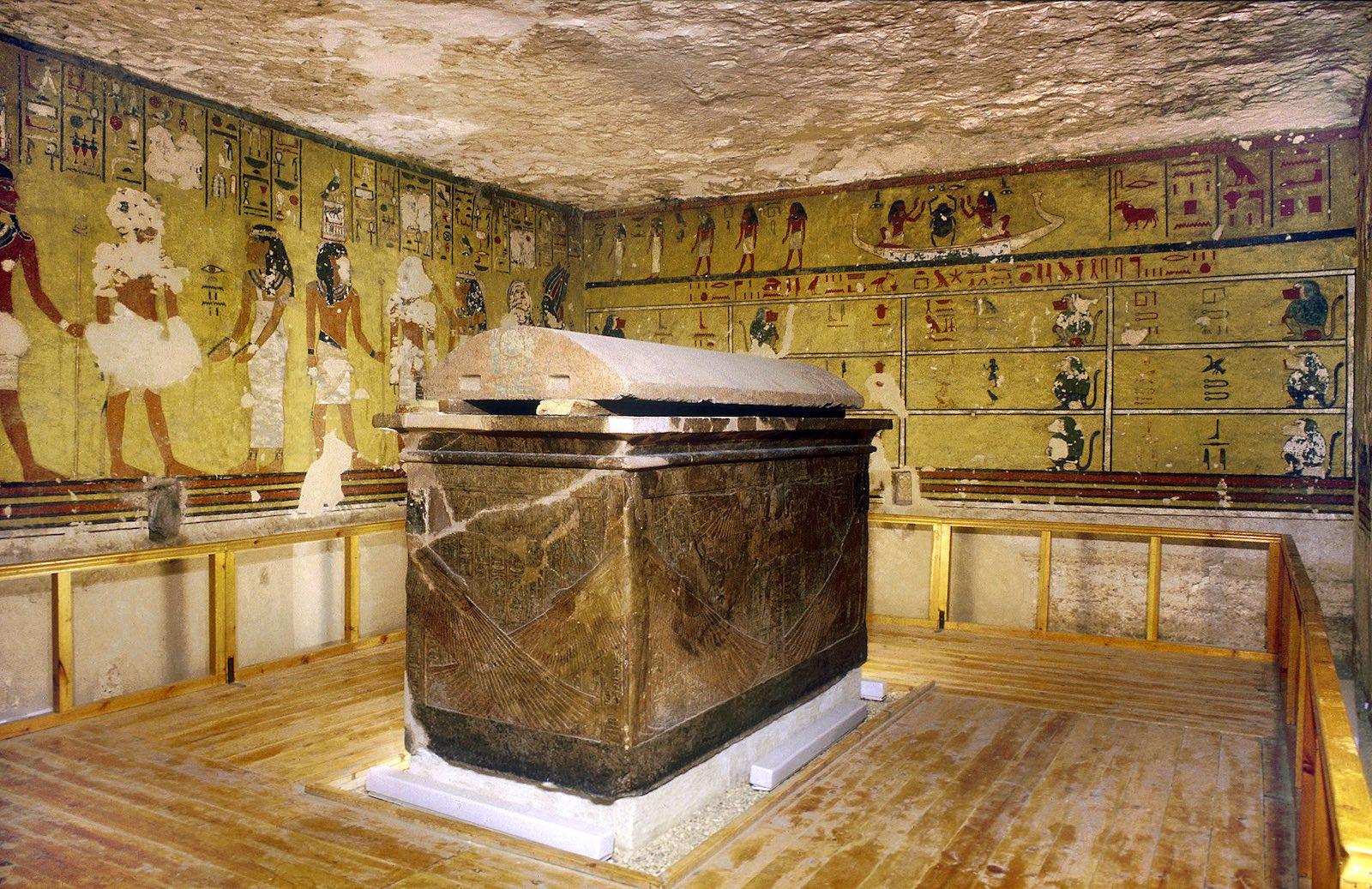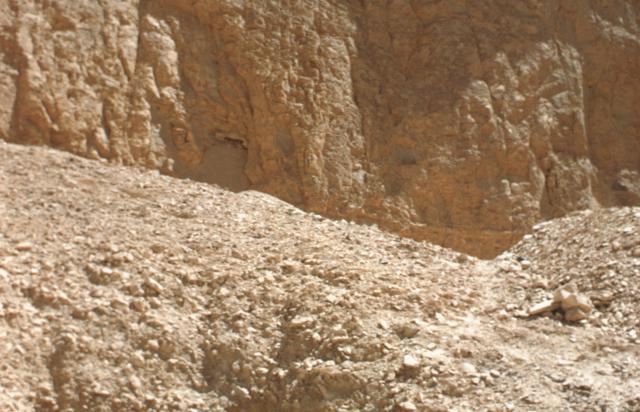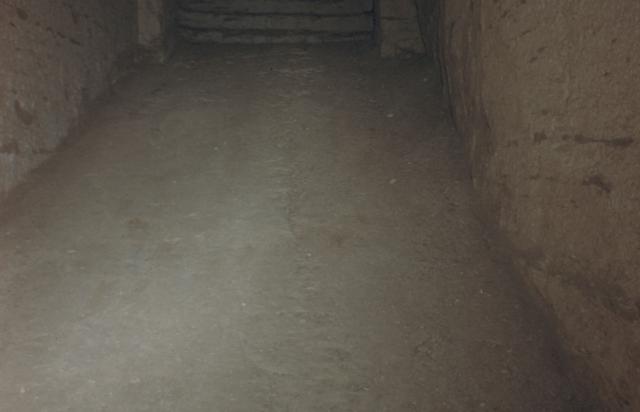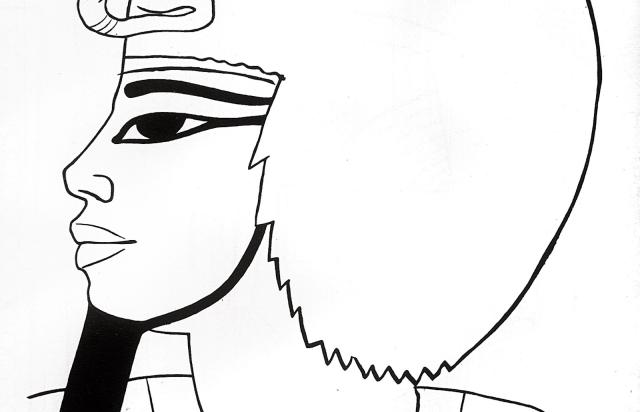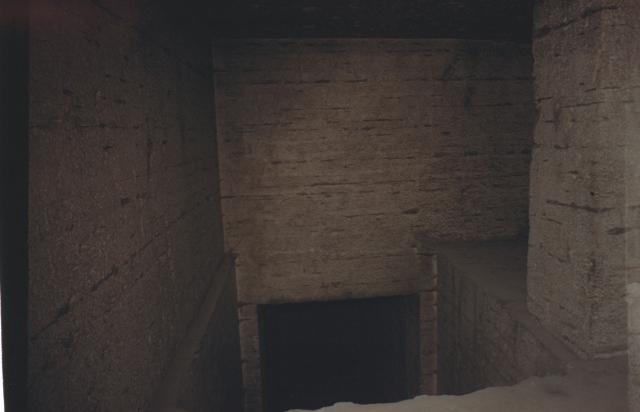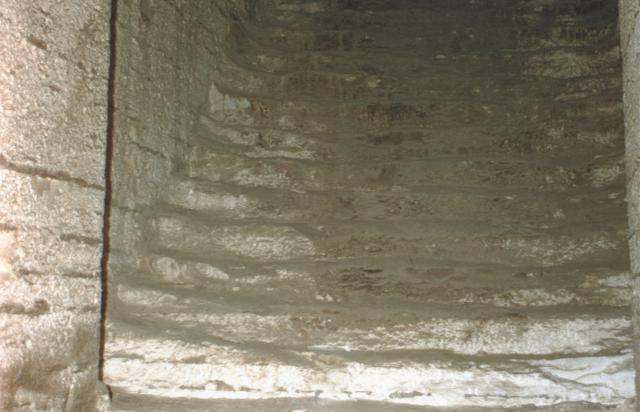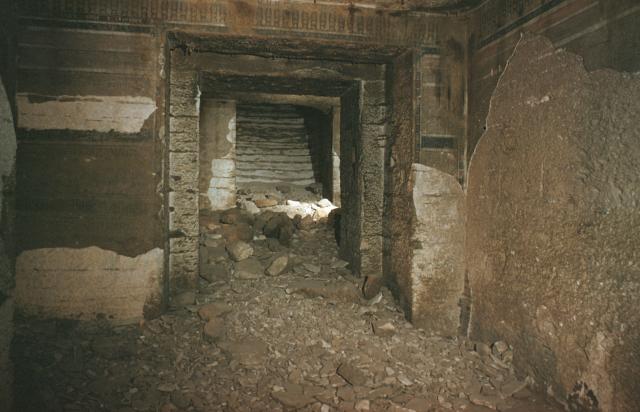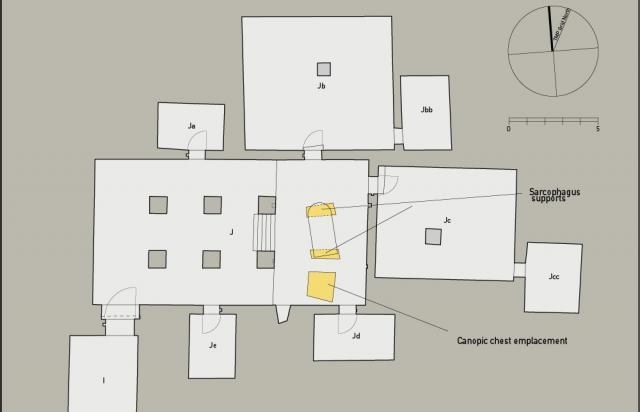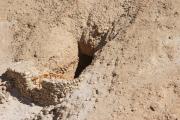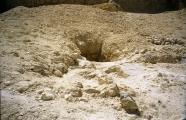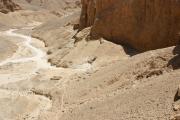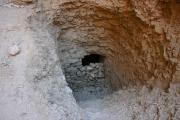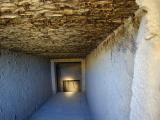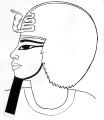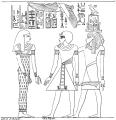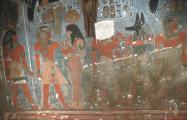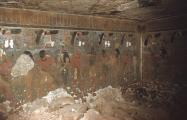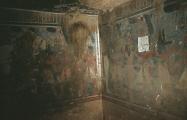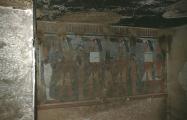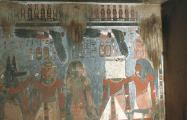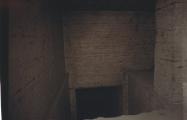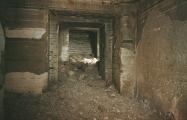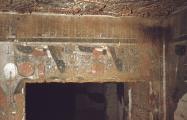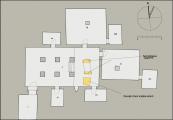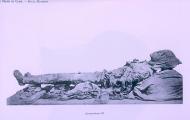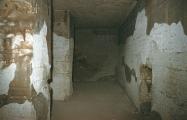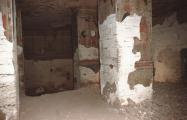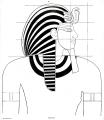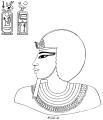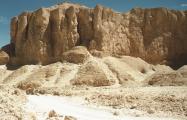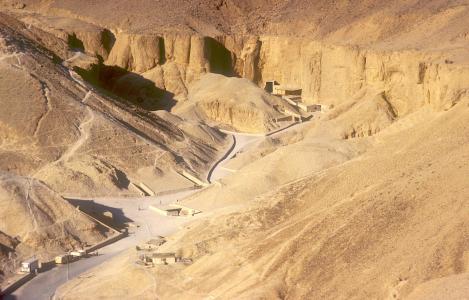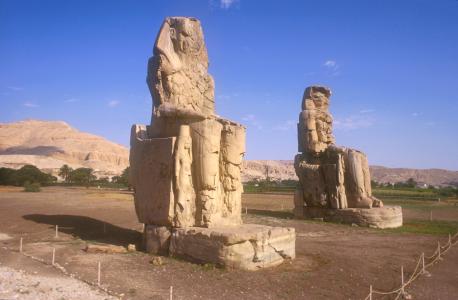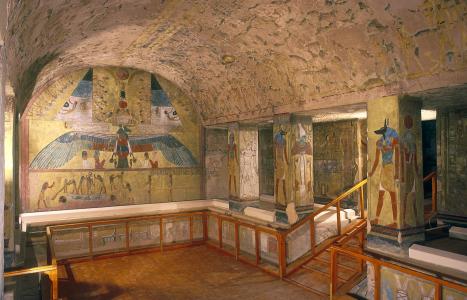KV 22
Amenhetep III
Entryway A
See entire tombThe entrance is cut in the side of the hill below a cliff face in an embankment on the east side half way into the West Valley. Seven foundation deposits were found in front of the undecorated entrance. A flight of steps leads down to the first gate of the tomb, beneath an overhang. The upper part of the stairway is badly broken.
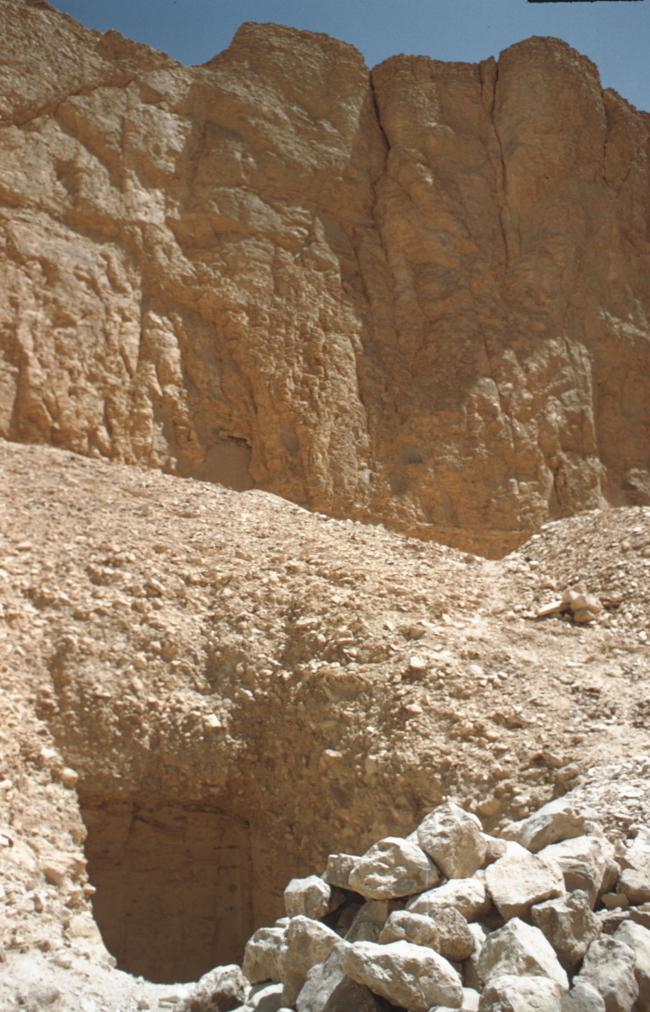
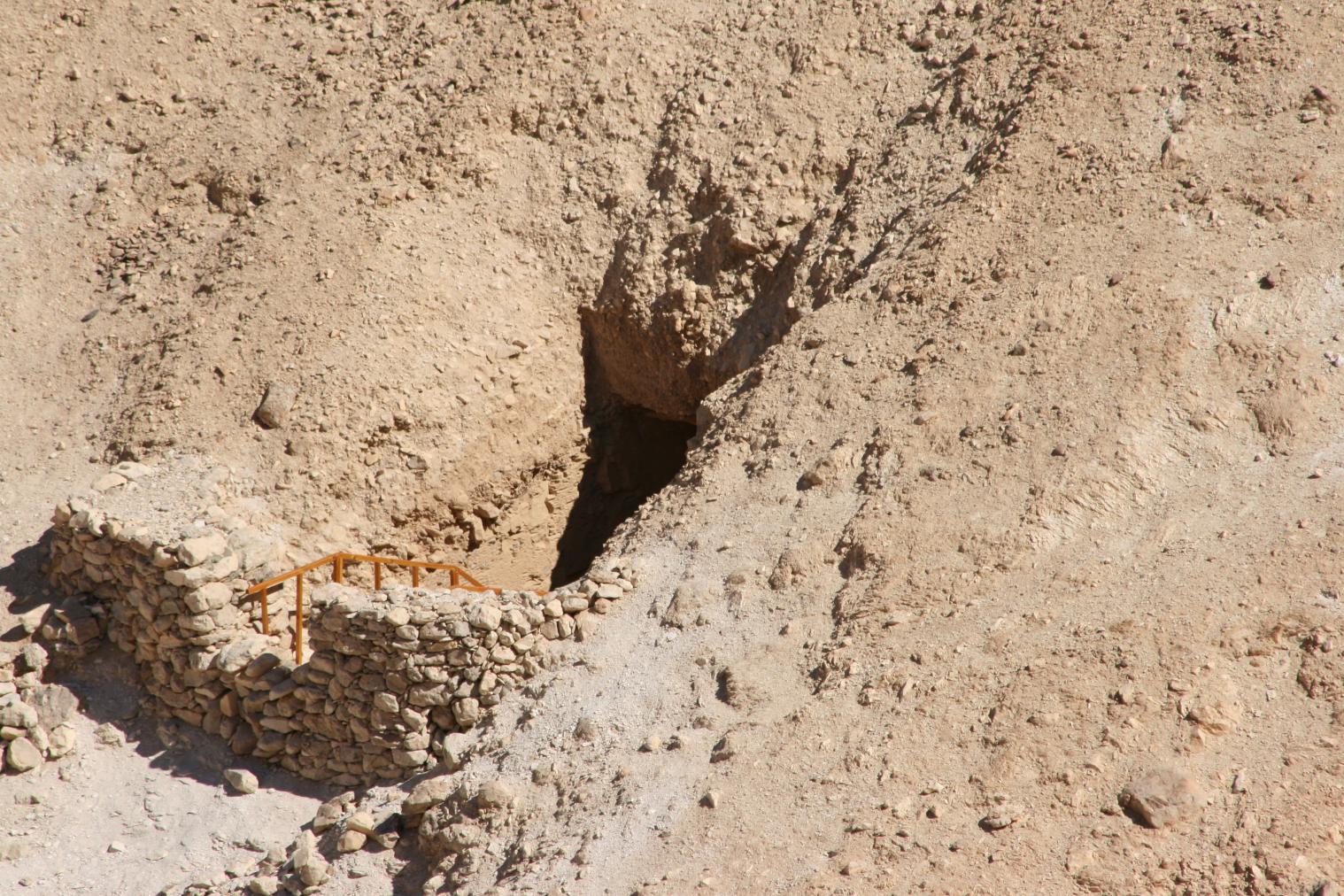
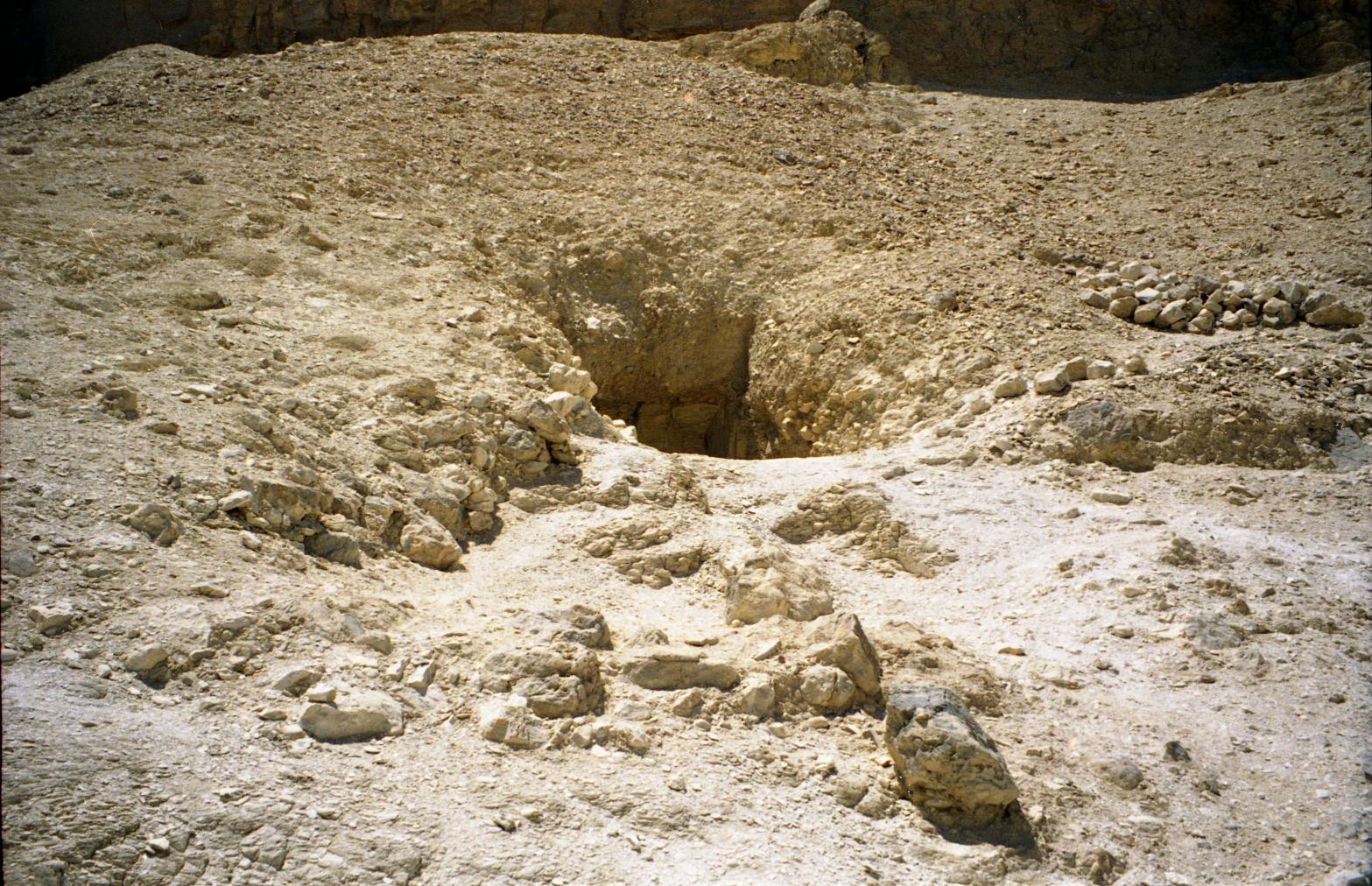
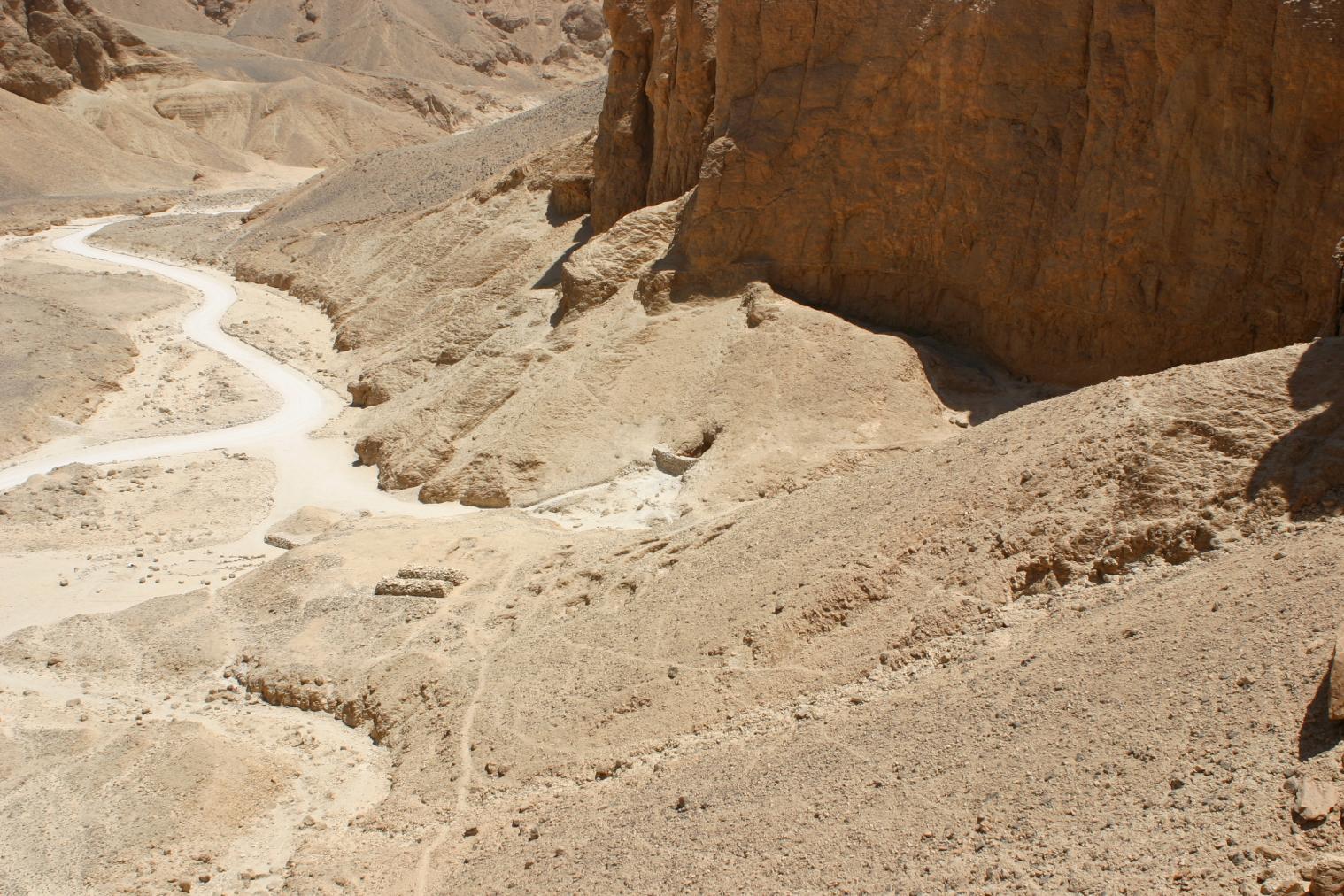
Gate B
See entire tombThe soffit and threshold of this undecorated gate slope down from front to back. A modern gate with cement jambs and two steps has been added.
Porter and Moss designation:
Corridor B
See entire tombThis is a sloping, undecorated corridor.
Porter and Moss designation:
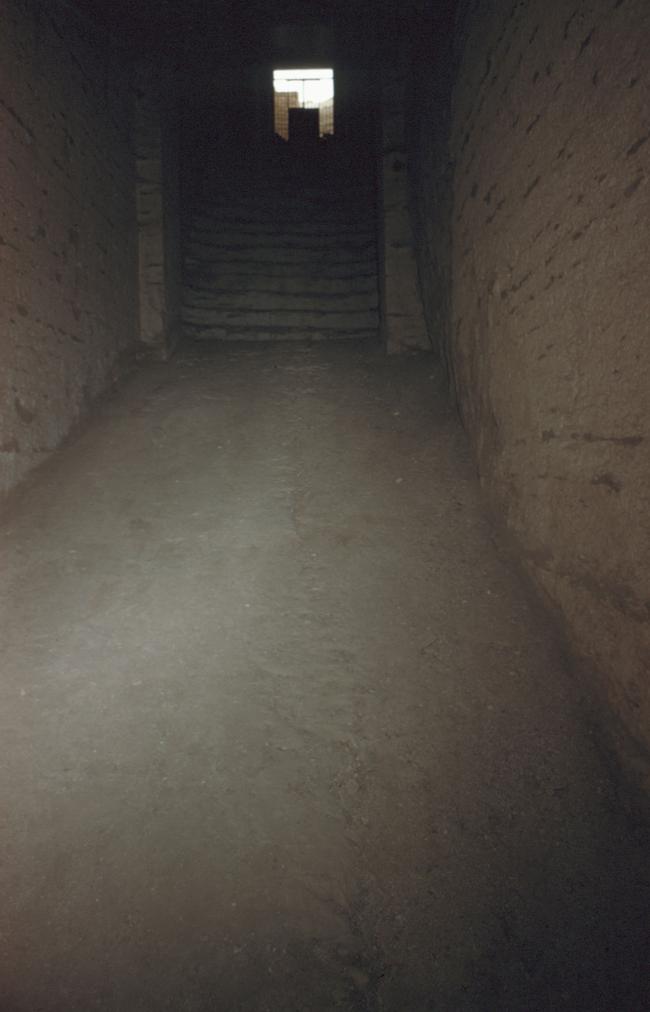
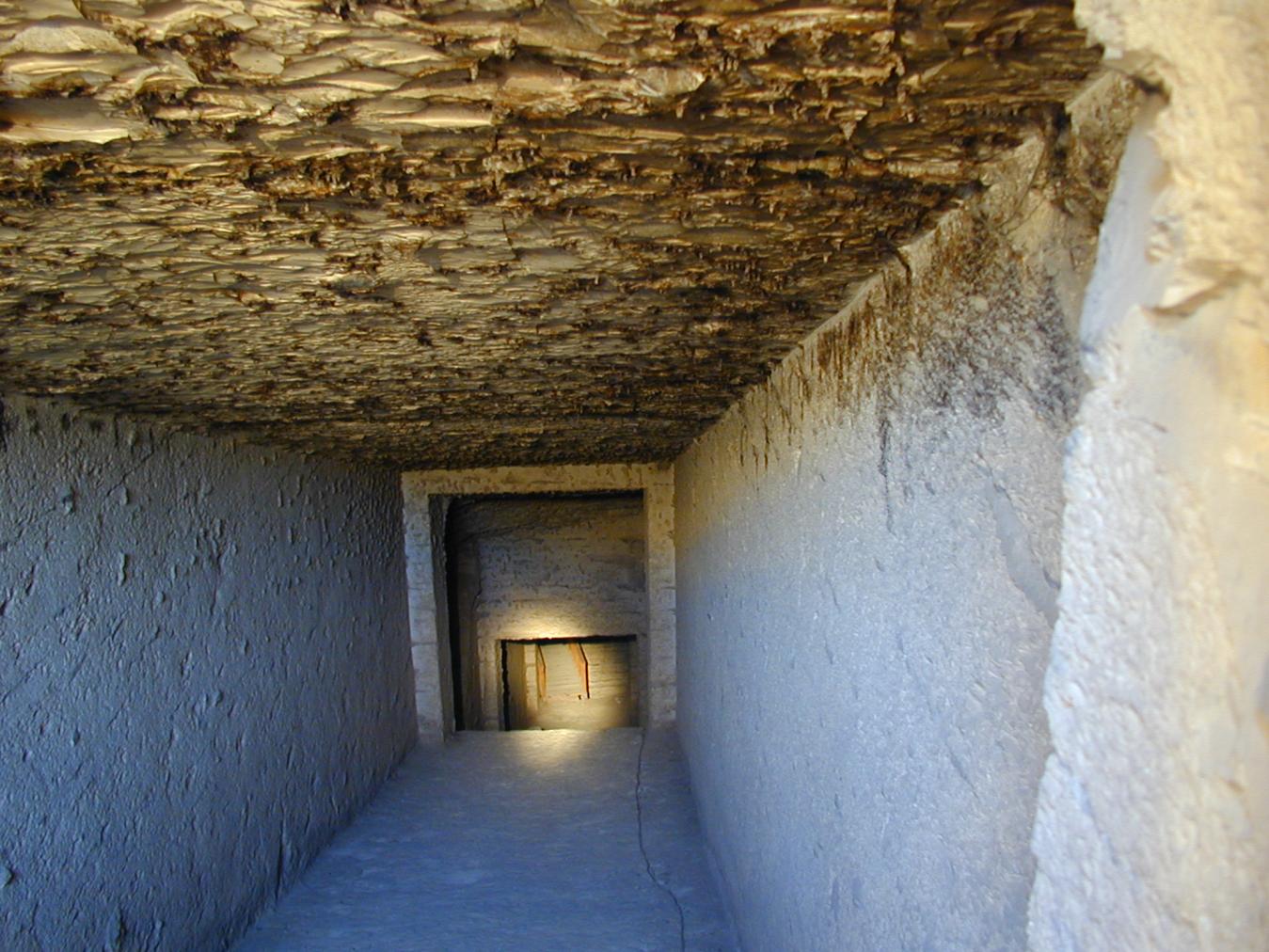
Gate C
See entire tombThe cutting of the gate was finished but it was not decorated. The soffit and threshold slope down from front to back.
Porter and Moss designation:
Stairwell C
See entire tombTwo trapezoidal recesses were cut at the top of the stairwell. The cutting of the recess on the left (north) is less finished than that on the right (south). The sixteen steps of the stairway end in a flat landing in front of gate D. There is some damage to the left face of the stairwell.
Porter and Moss designation:
Gate D
See entire tombThe soffit and threshold of this undecorated gate slope down from front to back.
Porter and Moss designation:
Corridor D
See entire tombThis undecorated corridor slopes down to well chamber E.
Porter and Moss designation:
Gate E
See entire tombThe soffit of this undecorated gate are level, while the threshold slopes down slightly.
Porter and Moss designation:
Well chamber E
See entire tombA deep shaft occupies the floor of this rectangular chamber and a gate in its front (west) wall leads to side chamber Ea. The walls and ceiling were almost completely decorated and painted. There are four scenes on the left (north) wall. The first shows the king, accompanied by his father's ka, embraced by Hathor. The remainder show the king receiving life from Anubis, the Western Goddess, and Osiris. The right (south) wall has four scenes, the first of which has the king with his father's ka before Nut. The rest of the scenes are the same as the ones on the left wall. The rear (east) wall originally had six scenes, but two were on the plastered blocking of the door, which is now gone. What remains shows the king receiving life from Hathor on either side of the door, and from Anubis and the Western Goddess to the south. Every representation of the king has a vulture, representing the goddess Nekhbet, hovering over the king's head. Across the top of the three walls runs a kheker frieze and a yellow and red painted border along the bottom. The chamber has a ceiling of yellow stars on a blue-painted background. In several instances, the face of the king has been cut out.
Porter and Moss designation:
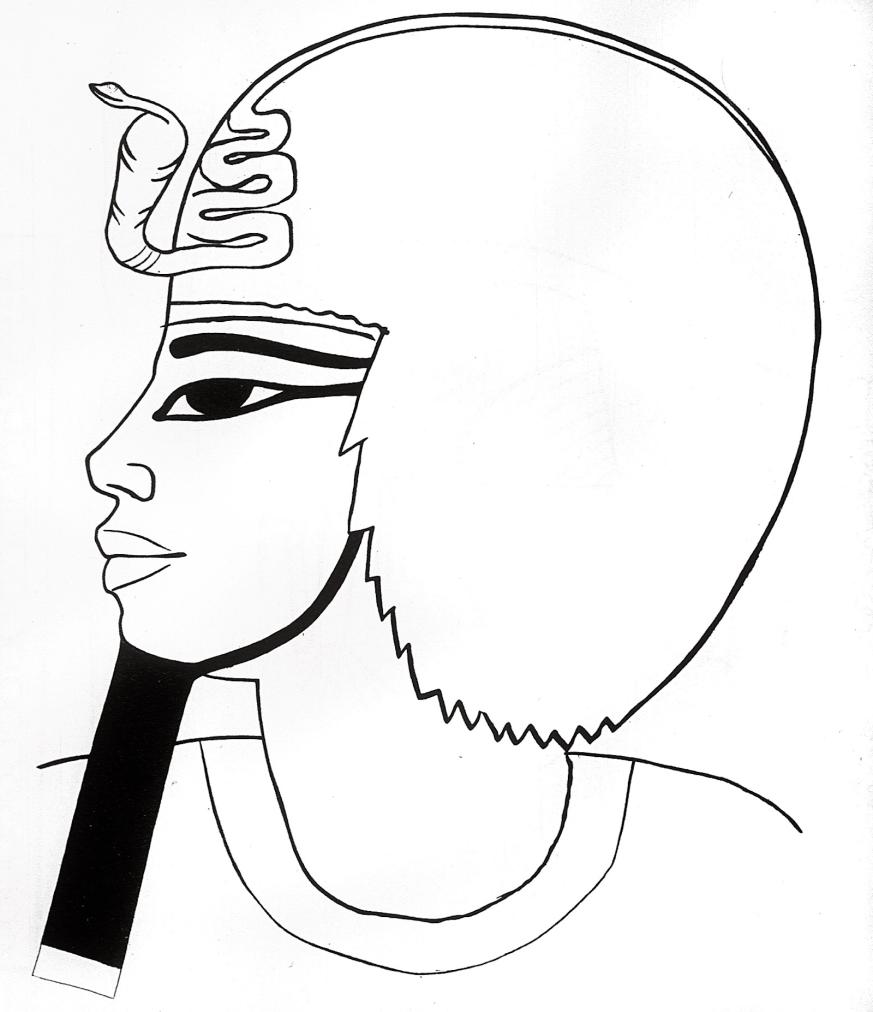
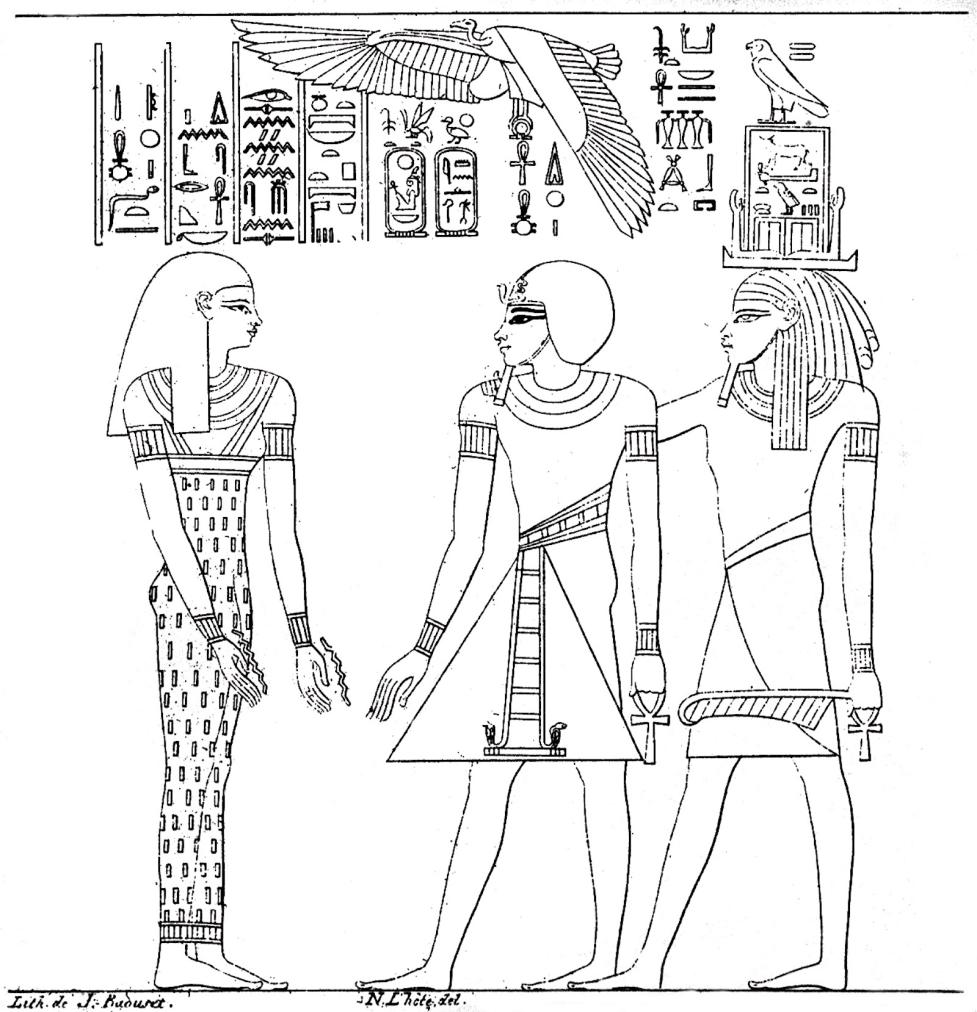
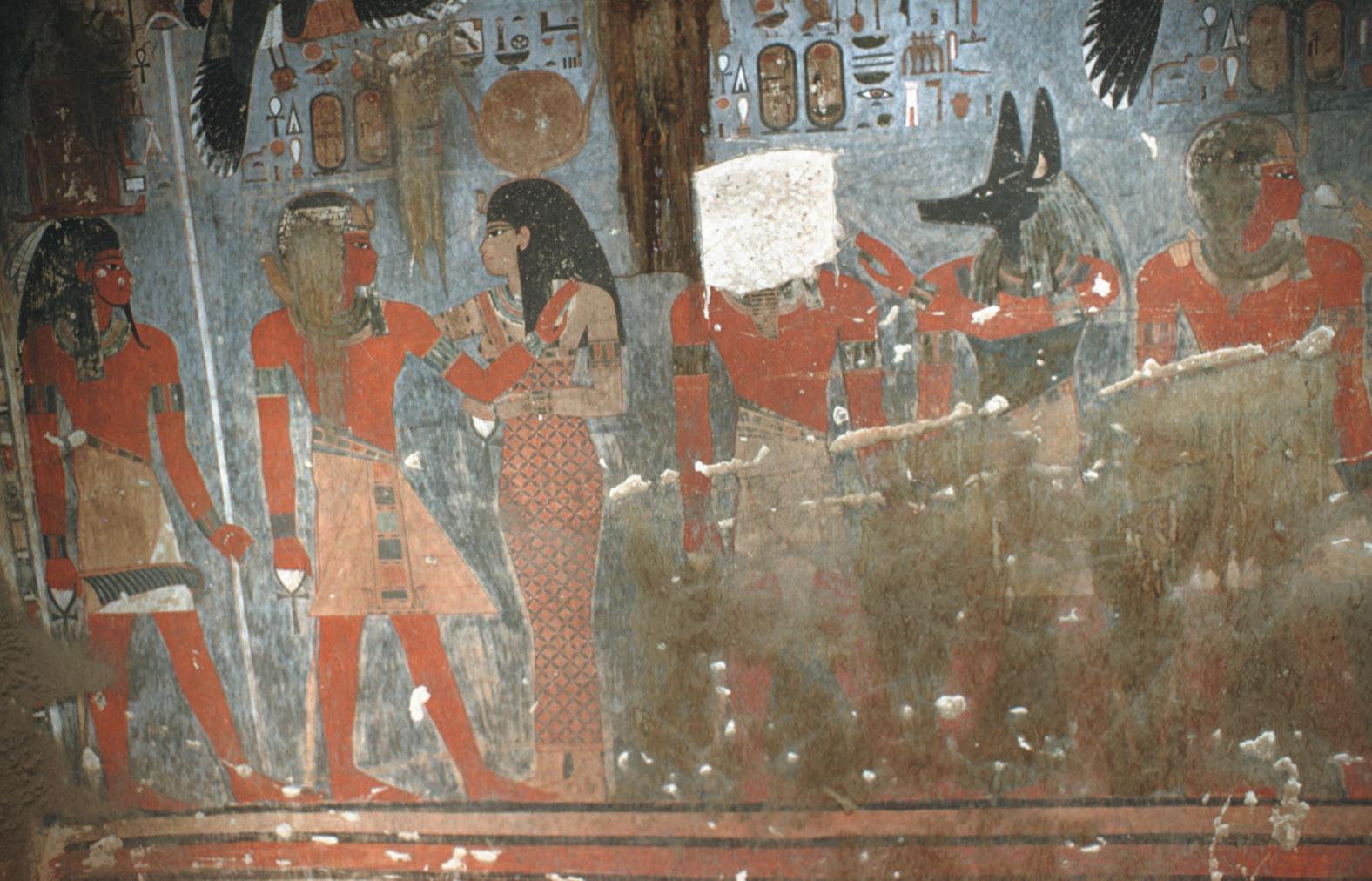
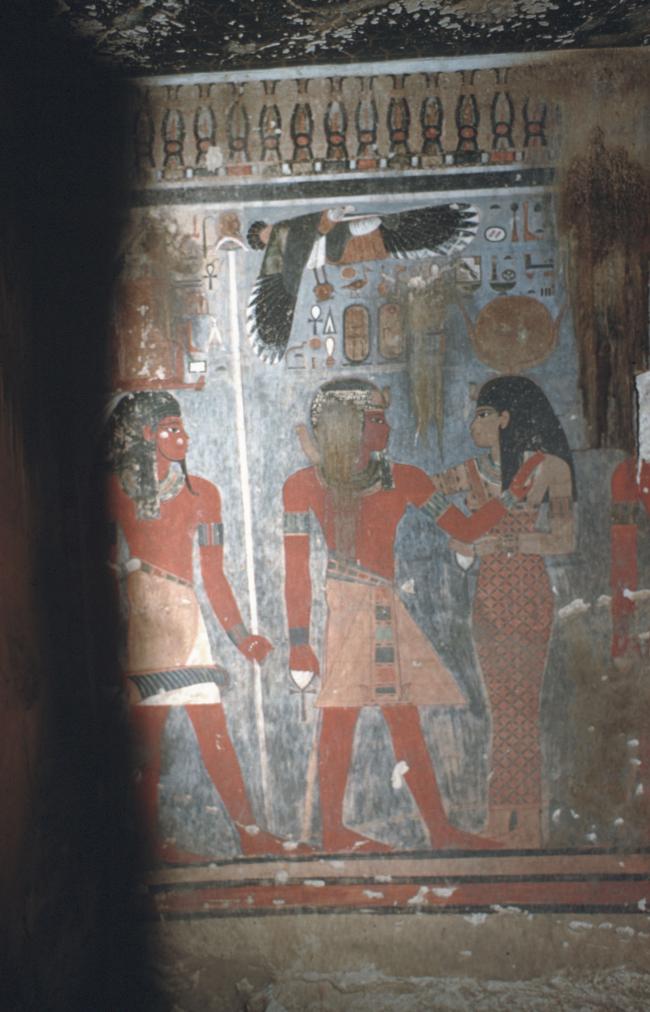
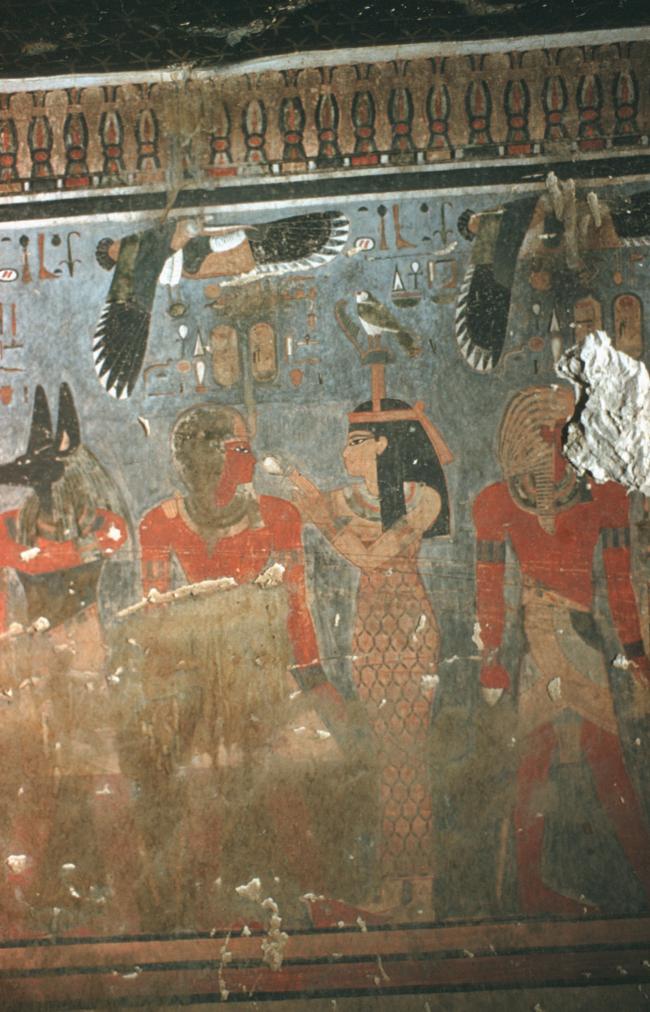
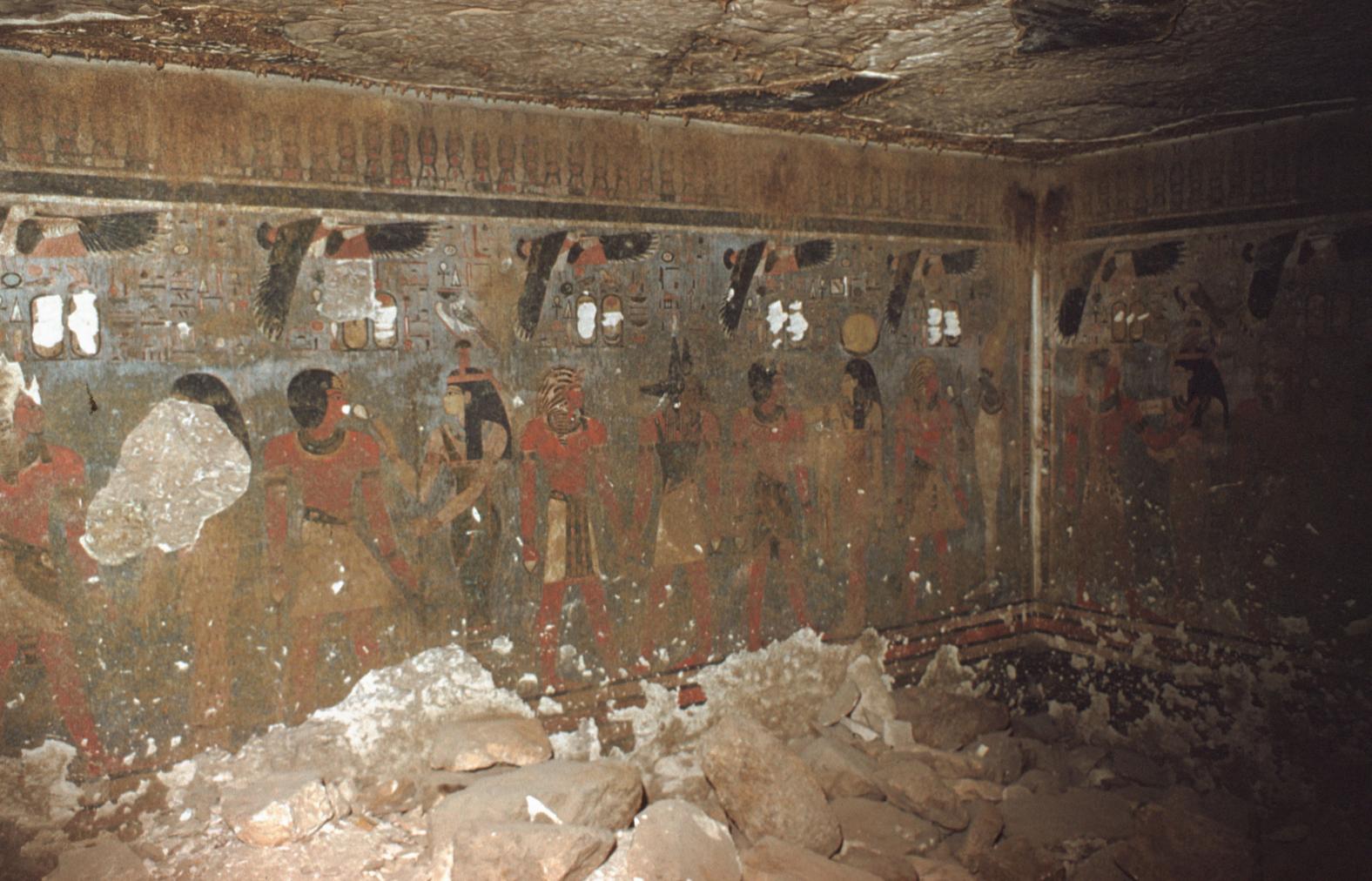
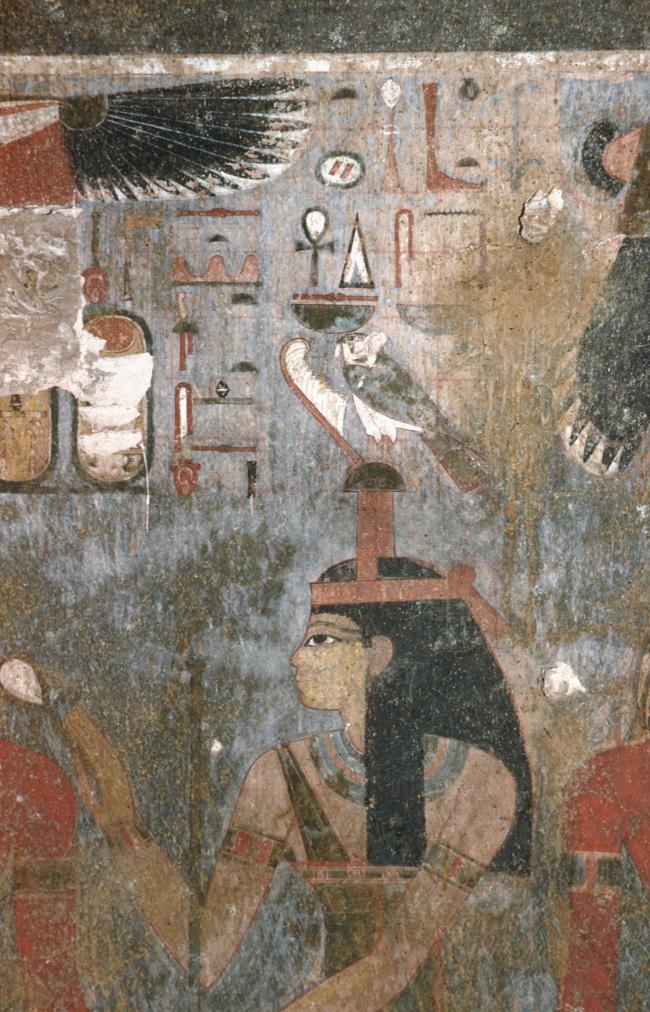
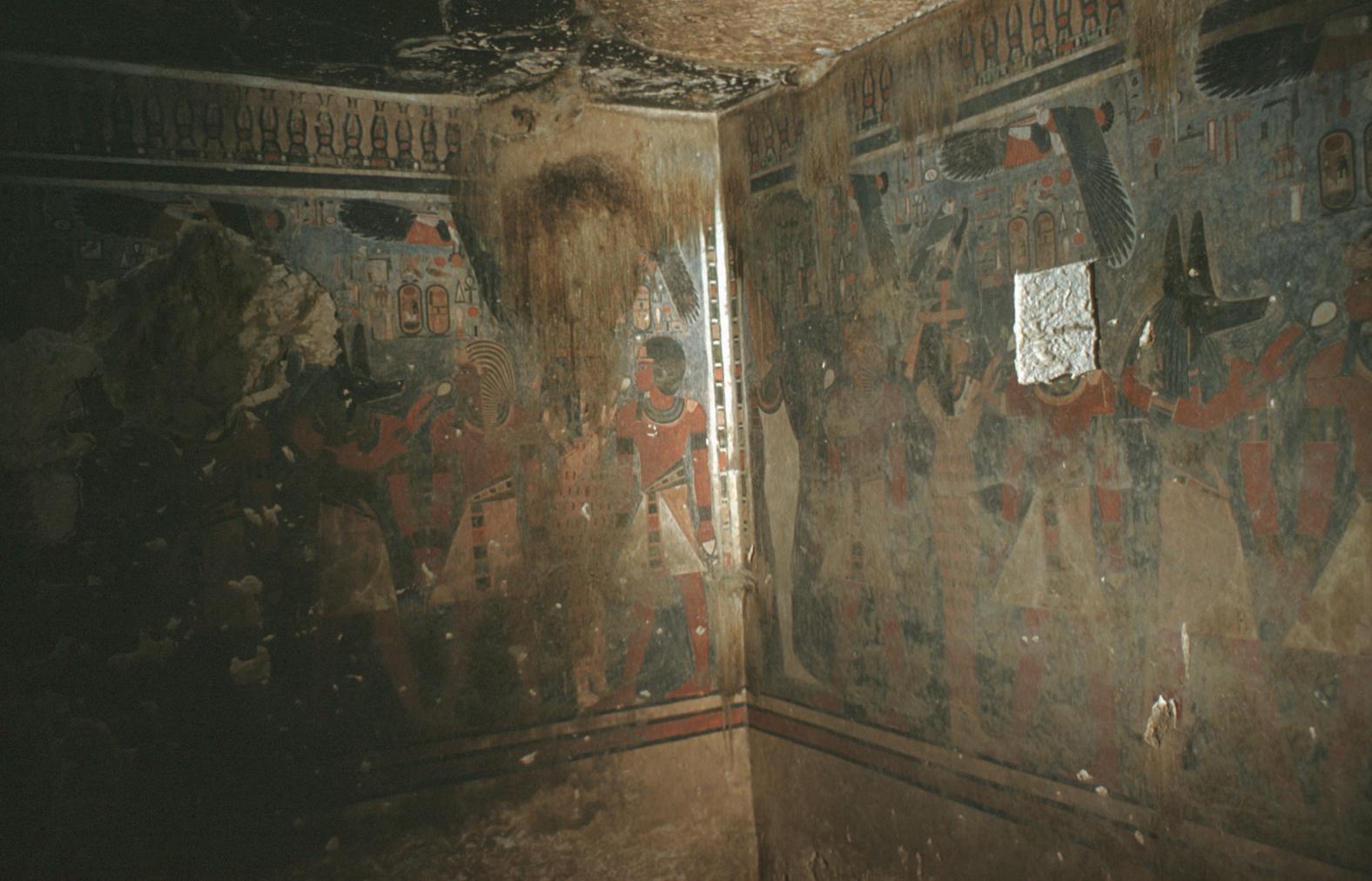
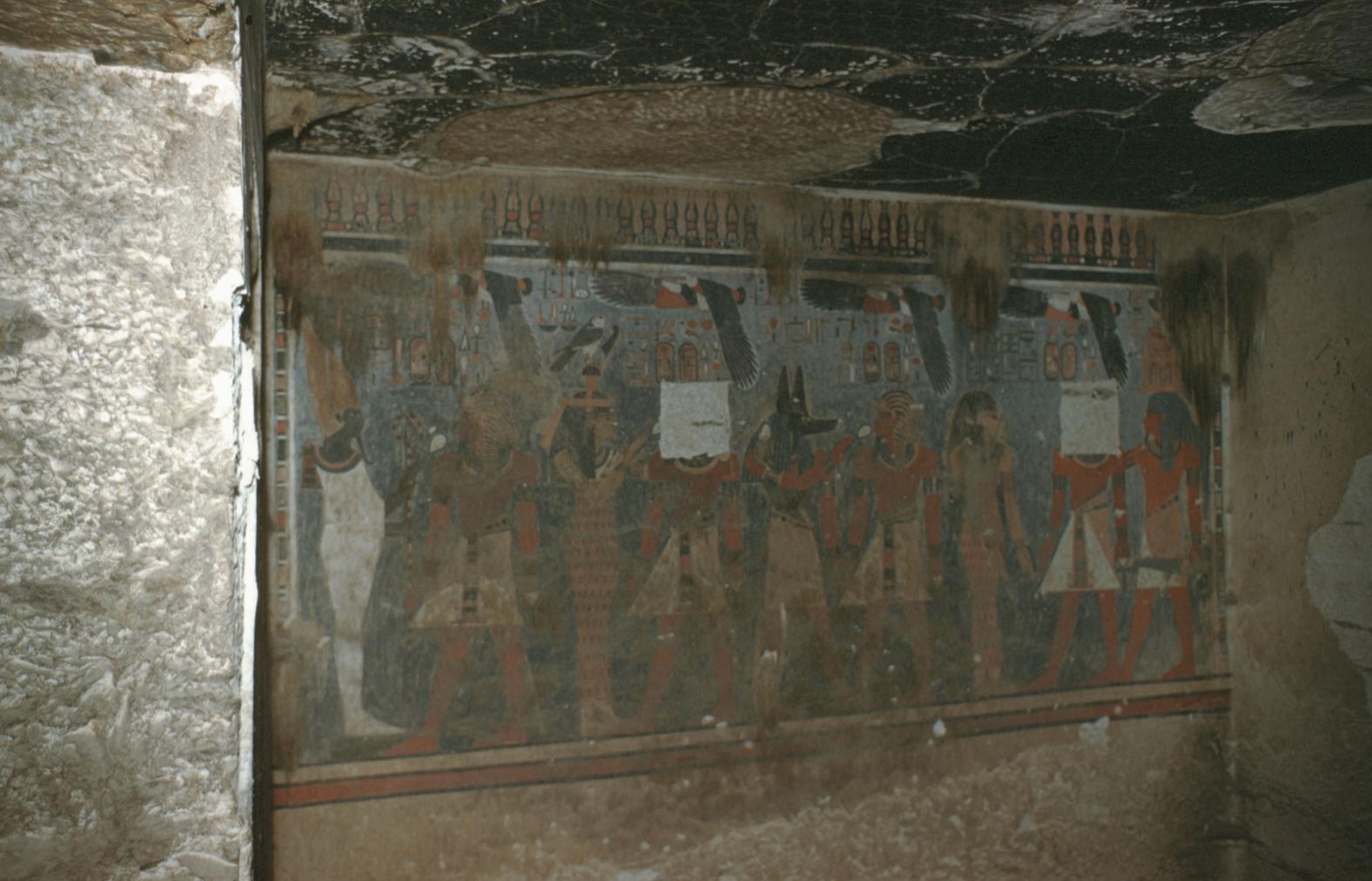
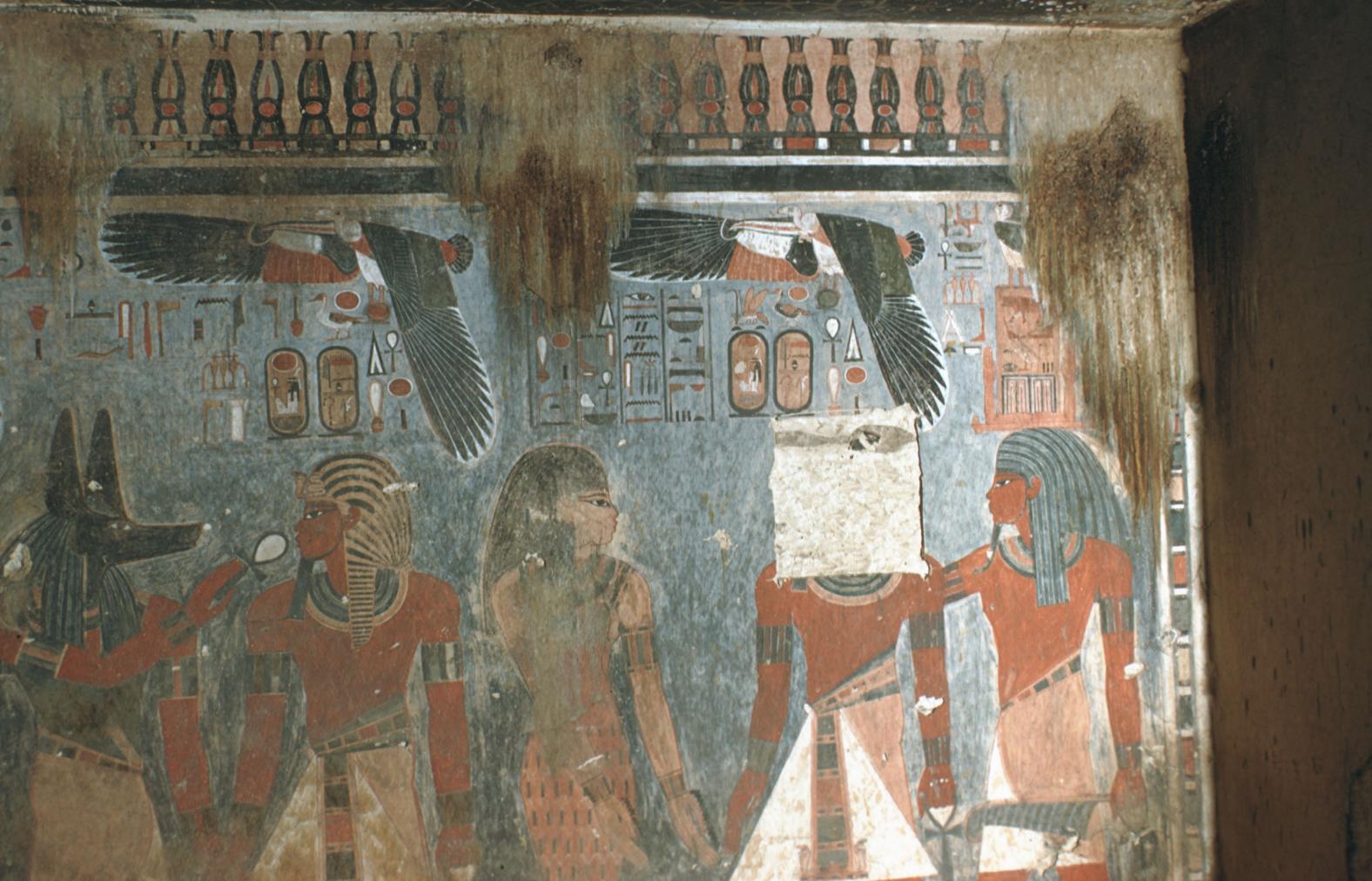
Gate Ea
See entire tombThis gate, located in the right half of the west wall at the bottom of the shaft, opens into side chamber Ea.
Side chamber Ea
See entire tombThe chamber lies at the bottom of the shaft in well chamber E. Two steps descend from the gate. The floor of this west-oriented chamber is 0.8 m (31.5 inches) lower than the bottom of the well shaft. The left (north) wall is scarred by chisel marks, the right (south) wall is unfinished.
Gate F
See entire tombGate F is cut north of center in the rear (east) wall of well chamber E. The threshold and soffit of this gate are level. Carter found evidence of blocking in the inner doorways of well chamber E and it is clear that on the rear (east) wall the paintings covered the sealed doorway of gate F.
Porter and Moss designation:
Pillared chamber F
See entire tombTwo pillars occupy the center of the chamber and lie on a north-south axis. A stepped descent is cut in the floor in the northwest corner of the chamber. The southwest corner of the chamber was not cut to the ceiling.
Porter and Moss designation:
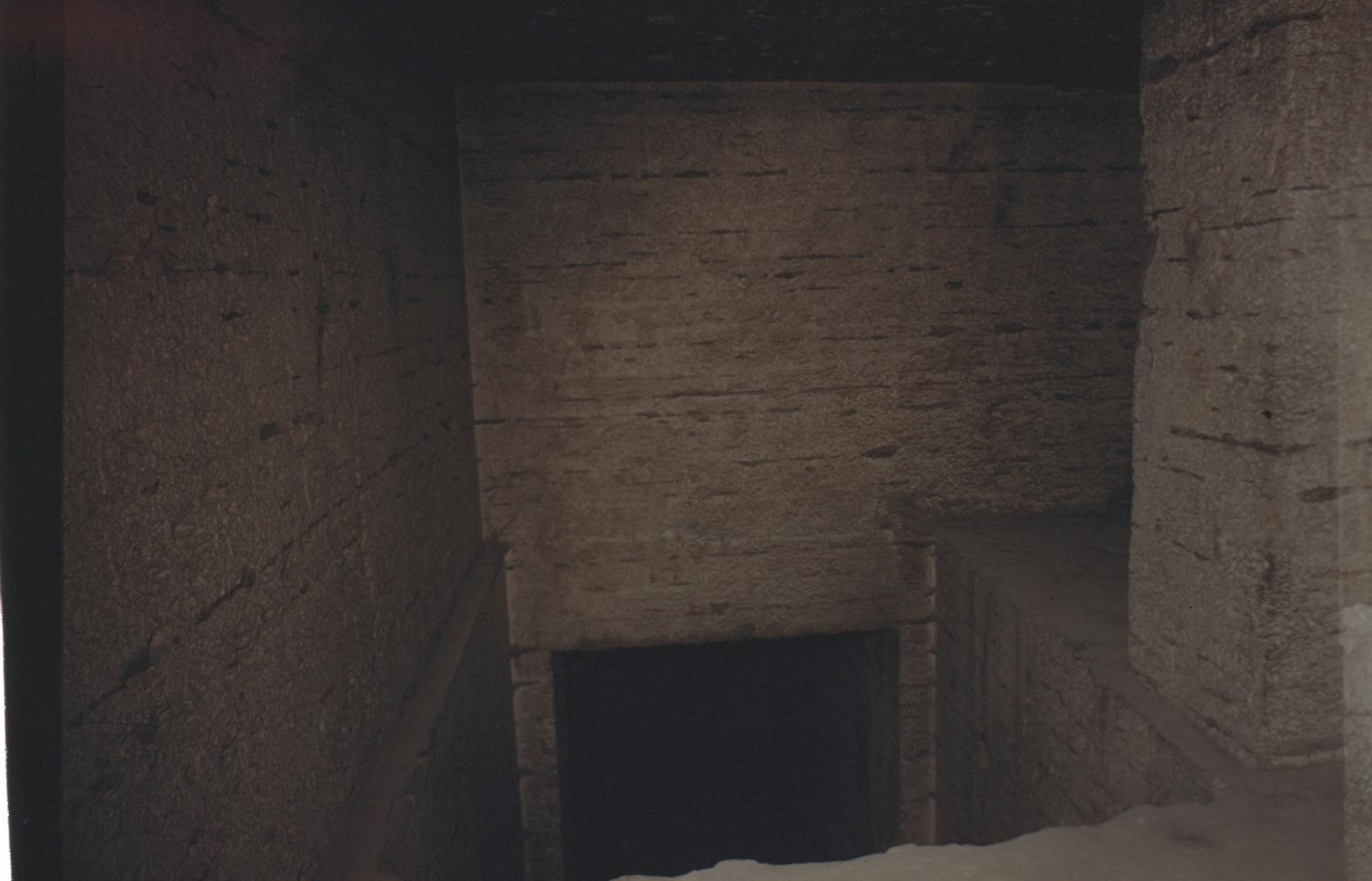
Descent F
See entire tombThe stepped descent begins near pillar 1 at the right end of the front wall of chamber F and ends at gate G.
Porter and Moss designation:
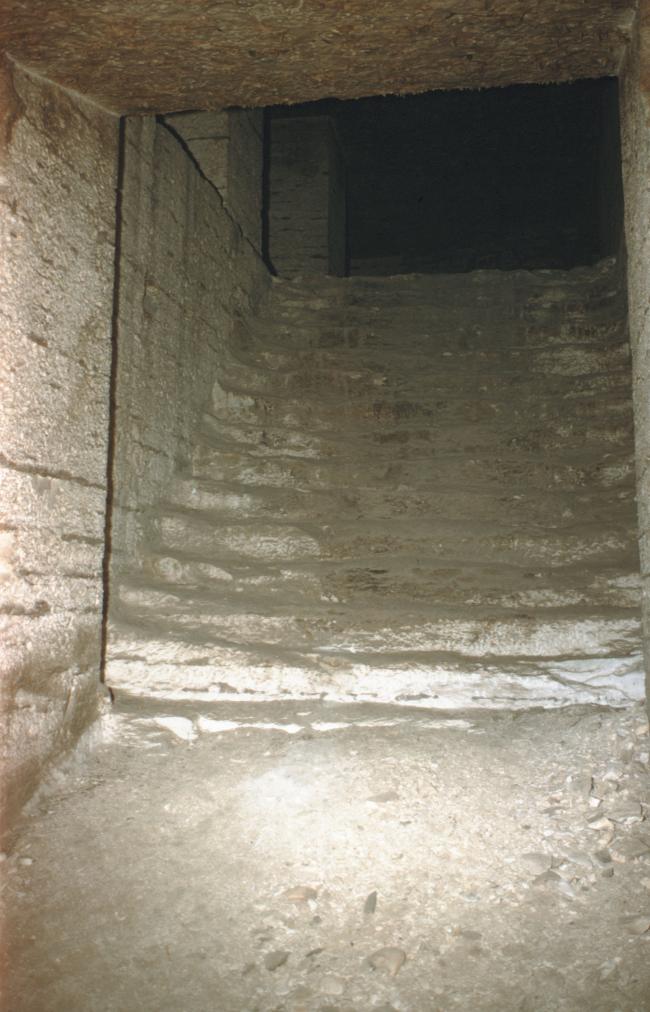
Gate G
See entire tombThe soffit and threshold of this gate slope downward from front to back.
Porter and Moss designation:
Corridor G
See entire tombThe corridor slopes directly into stairwell H. There is no intervening gateway.
Porter and Moss designation:

Stairwell H
See entire tombThis short stairwell has of a flight of steep steps. The ceiling slope approximates that of corridor G, not that of the stairway. An unusual feature is the lack of a gate between G and H. An originally flat landing at the bottom of the stairway in front of gate I has had steps cut into it.
Porter and Moss designation:
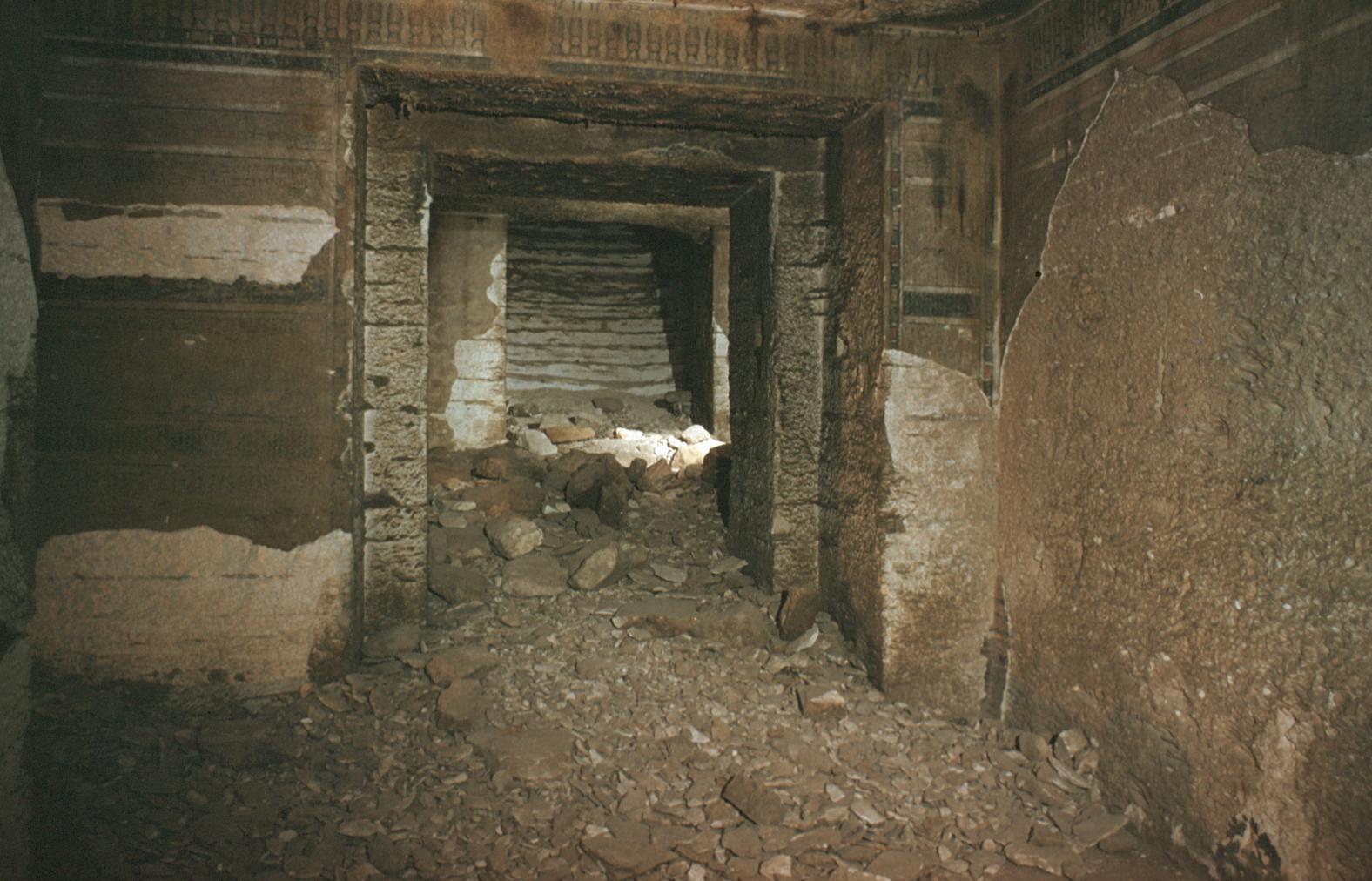
Gate I
See entire tombThe gate into chamber I has a level threshold, but the soffit was cut sloping down from front to back. There is a hieratic graffito on the right (east) of the gate.
Porter and Moss designation:

Chamber I
See entire tombThe walls and ceiling of this chamber preceding the burial chamber were decorated and painted, with the exception of the front walls. On the left (west) wall, the king receives life from Hathor, Nut, the Western Goddess, Anubis, Hathor and Osiris. Corresponding scenes, on the right (east) wall, include the king before the same arrangement of deities. These scenes have been damaged. On the rear (north) wall, four scenes are divided in two groups: the king before the Western Goddess and Anubis are shown on the left; the king and his ka before Nut and Hathor are shown on the right. Much of the right hand groups of figures has been lost, together with the blocking of the door on which they were painted.
Porter and Moss designation:
Gate J
See entire tombThe gate is cut right of center of the rear (north) wall of chamber I and opens into the southwest corner of the upper level of burial chamber J. The gate has compound jambs and there are two wide steps down from the floor level of chamber I to that of the upper level of burial chamber J. A rectangular notch in the left (west) outer thickness contains part of a thin wood slab, centrally pierced and held with plaster. It served as a door bolt hole. A horizontal slot along the inner edge of the outer soffit is an emplacement for the lintel beam that held the a door pivot. The gate was originally sealed.
Porter and Moss designation:
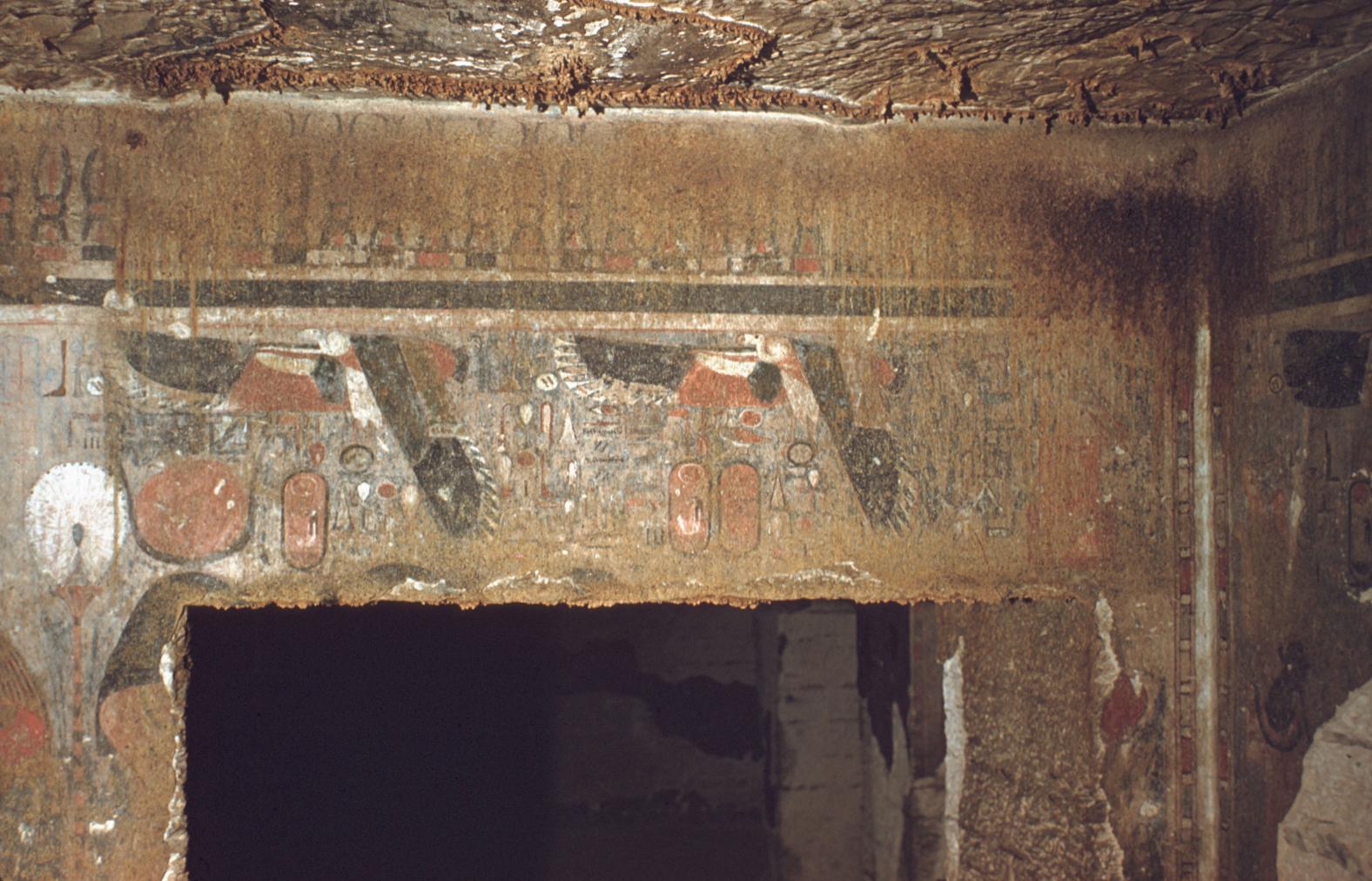
Burial chamber J
See entire tombThe floor at the right (east) end of the burial chamber is sunken and reached by a narrow flight of five steps between the easternmost pair of pillars. The red granite sarcophagus lay in this sunken section, where two parallel rectangular slots in the center of the floor marked the position for blocks to support the missing box. Only the fragments of the broken lid now remain. At the front (south) end of this area, a deeper pit may be an emplacement for the canopic chest. Pairs of magical brick niches were cut in the right wall and in the left wall of the lower level beneath the pillars. The upper level has two rows of three pillars on an east-west axis.
Side chambers open off the front and rear walls of the upper level of the chamber. Another side chamber opens off the front wall of the lower level. Two suites of possible subsidiary burial chambers open through the right and rear walls of the lower level. A recess at the right end of the front wall of the lower level may represent a gate cut for another side chamber but abandoned.
The walls were plastered and decorated showing the complete Imydwat. The text and figures were rendered in a cursive style more appropriate to papyrus versions, also seen in KV 34 and KV 35. This version of the composition, together with the abbreviated version, begins on the left end of the front wall and proceeds clockwise around the chamber to finish on the right wall. Much of the plaster has fallen away from the lower parts of the walls. The pillars are decorated with the king before such deities as Hathor, Osiris, the Western Goddess, and Anubis. The original layout grids, applied to assist the artists, are still visible on the faces of the pillars. Some of the pillars are badly cracked and have lost their painted plaster. In some instances, modern vandals have cut out the faces of figures. The ceiling plaster, much of which has fallen away, was decorated with yellow stars on a blue background.
Chamber plan:
RectangularRelationship to main tomb axis:
ParallelChamber layout:
Pillared front upper level, sunken rear lower levelFloor:
Two levelsCeiling:
Flat
Porter and Moss designation:
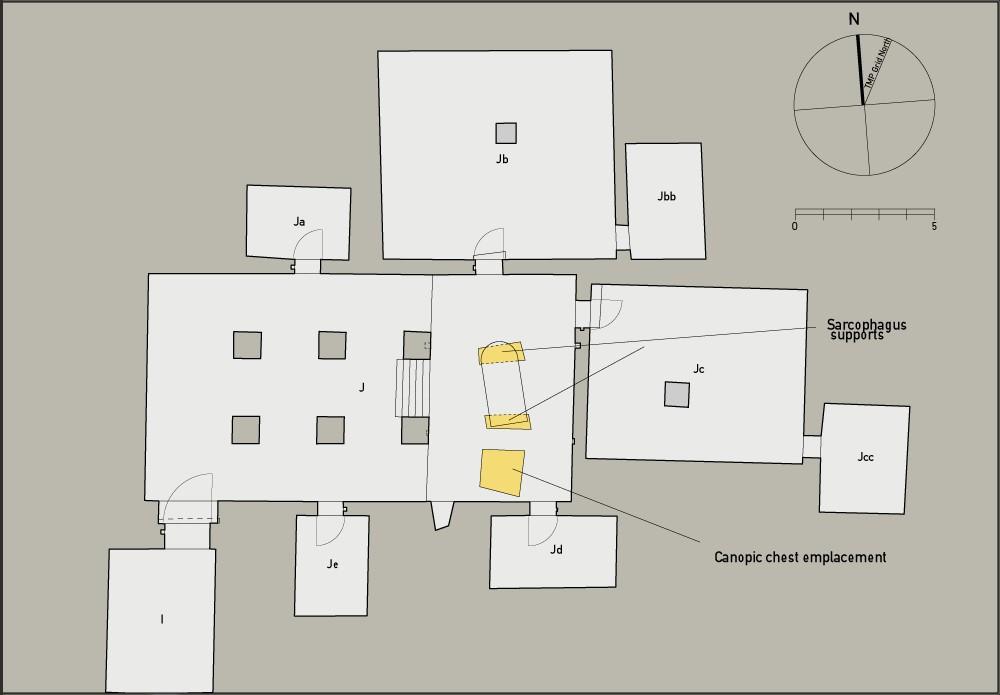
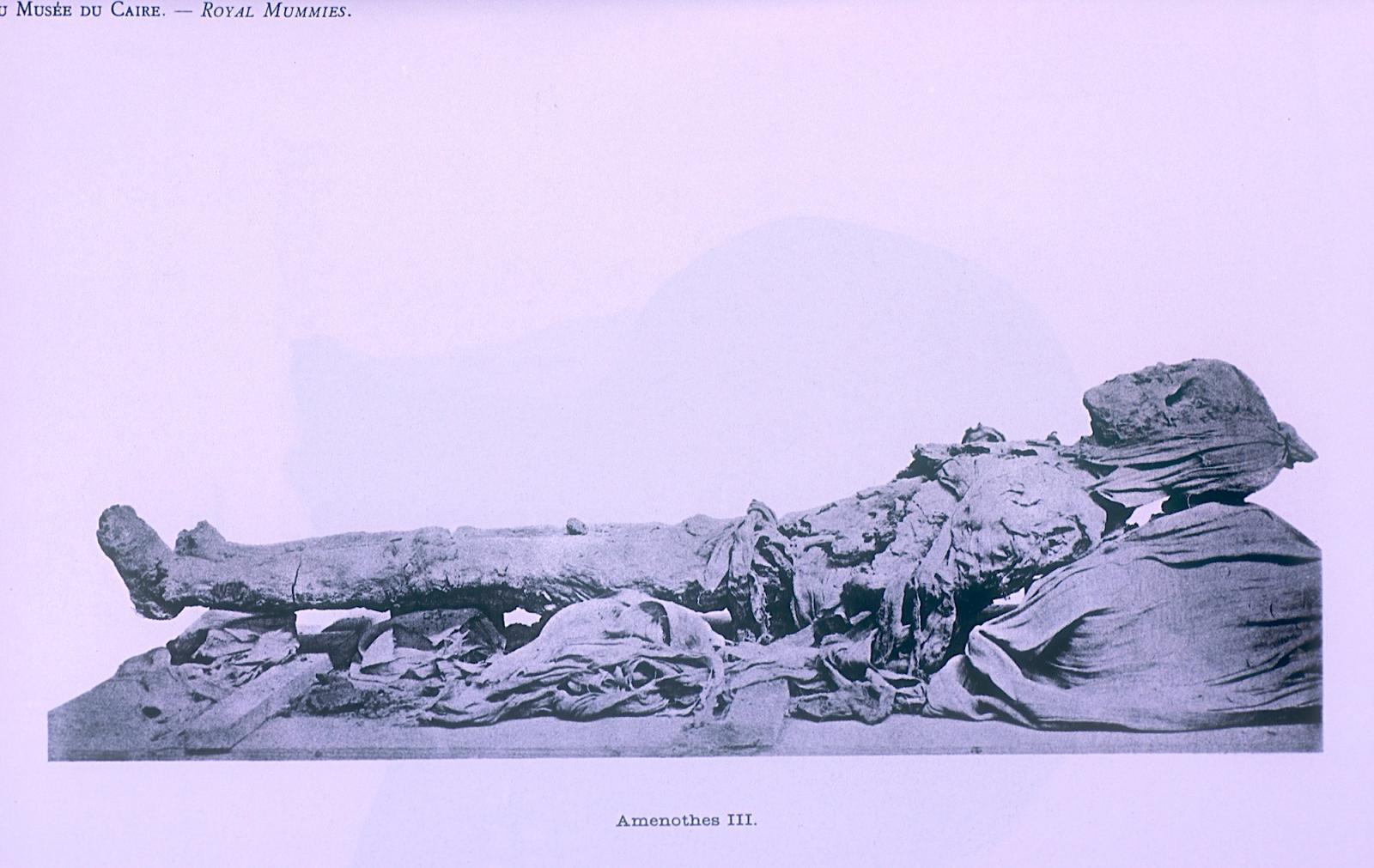
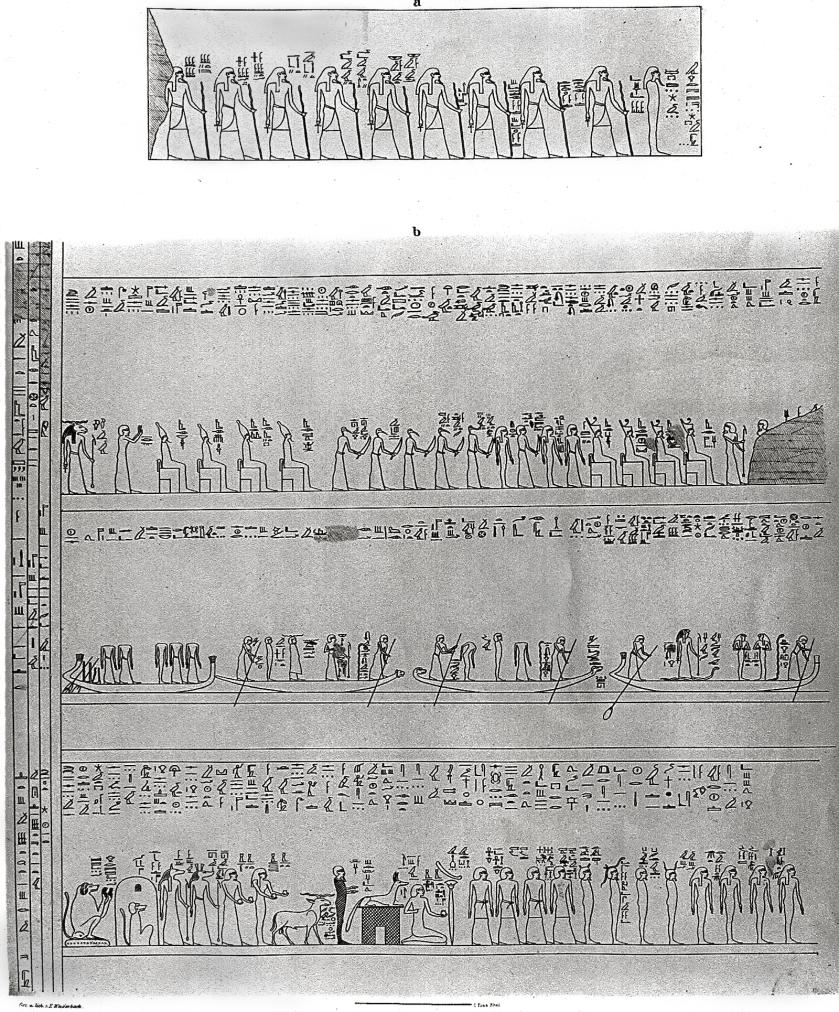
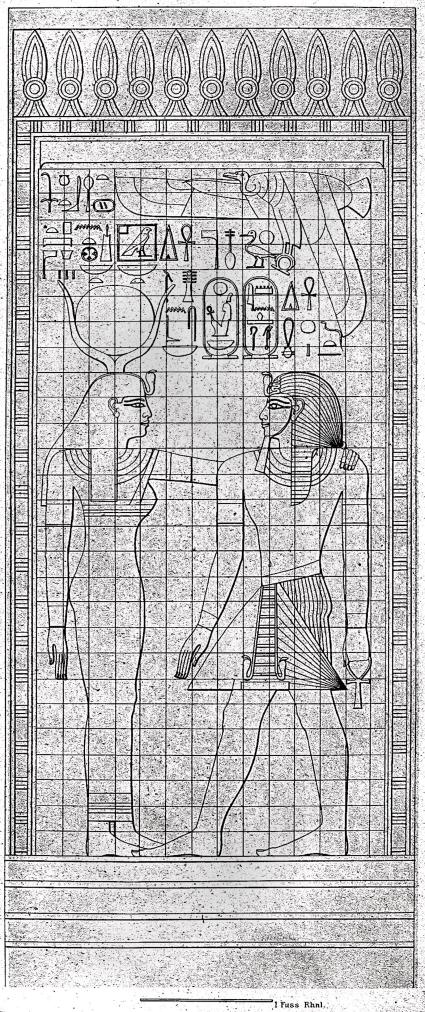
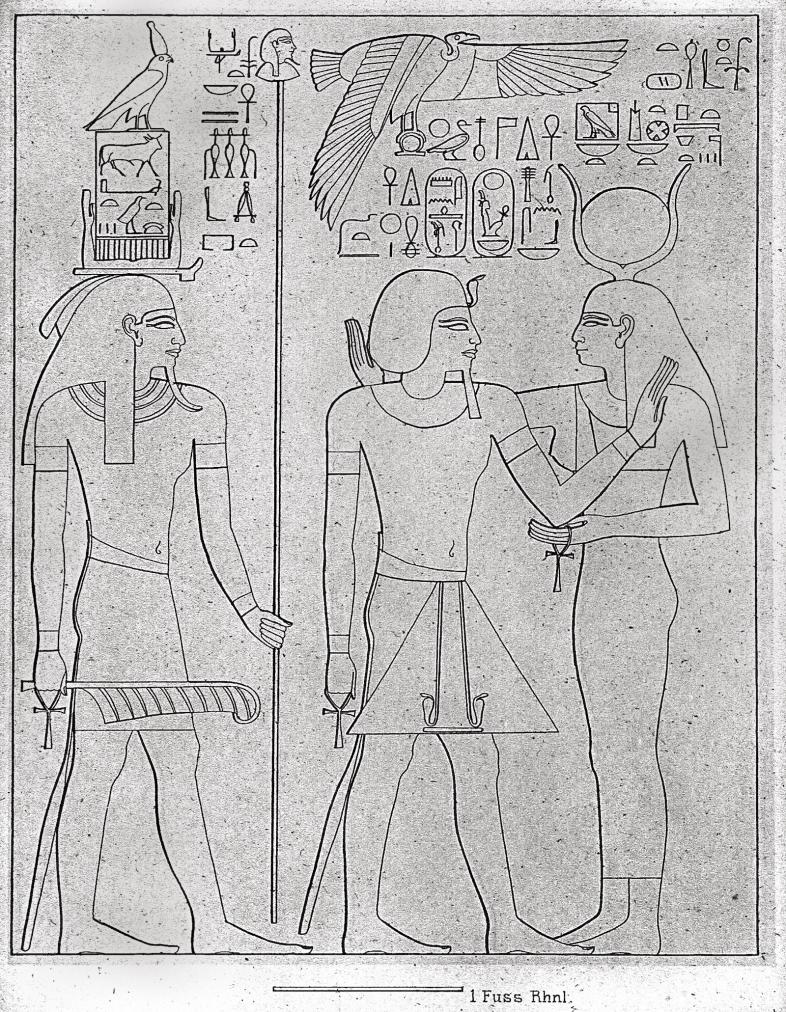
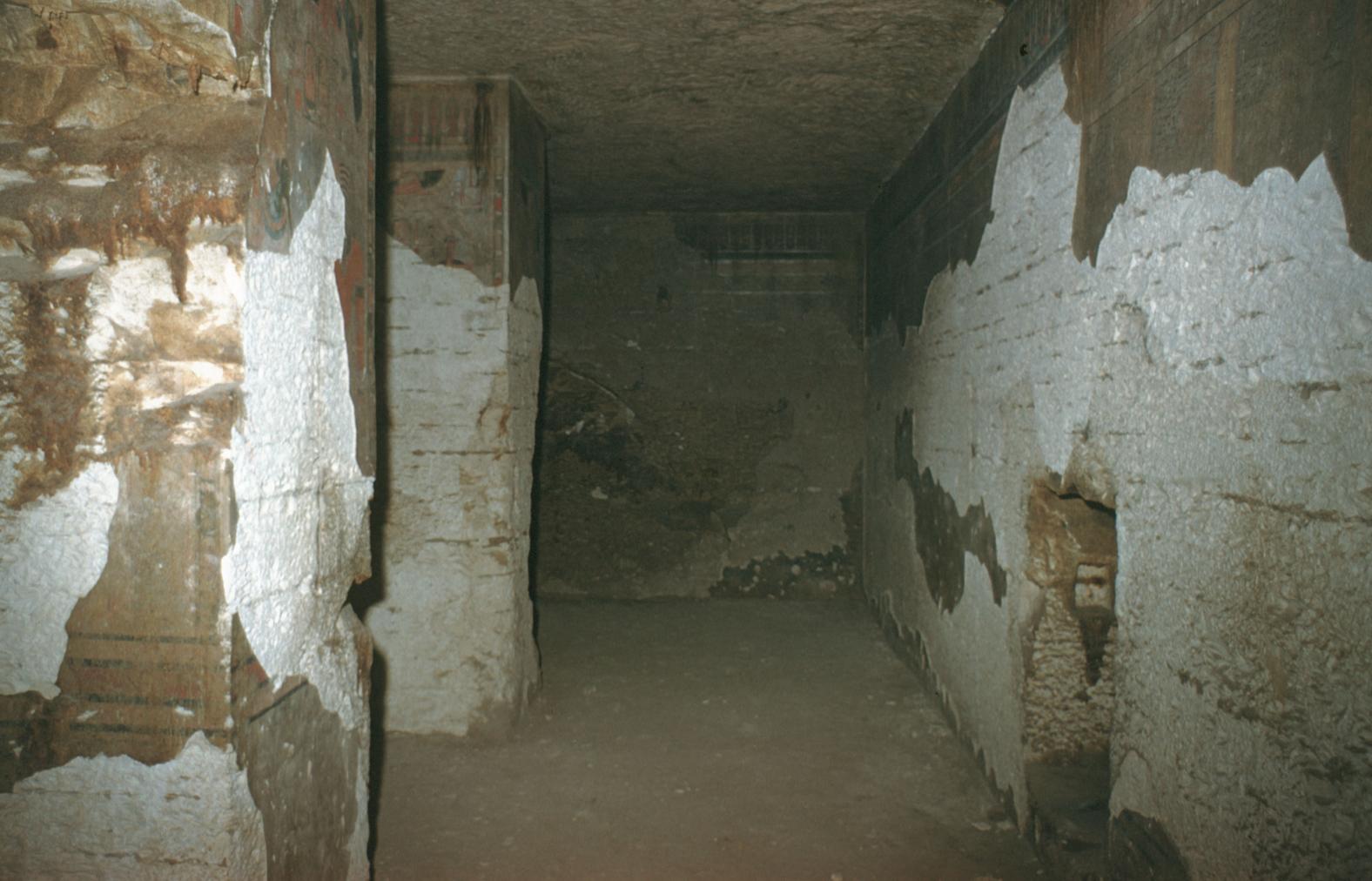
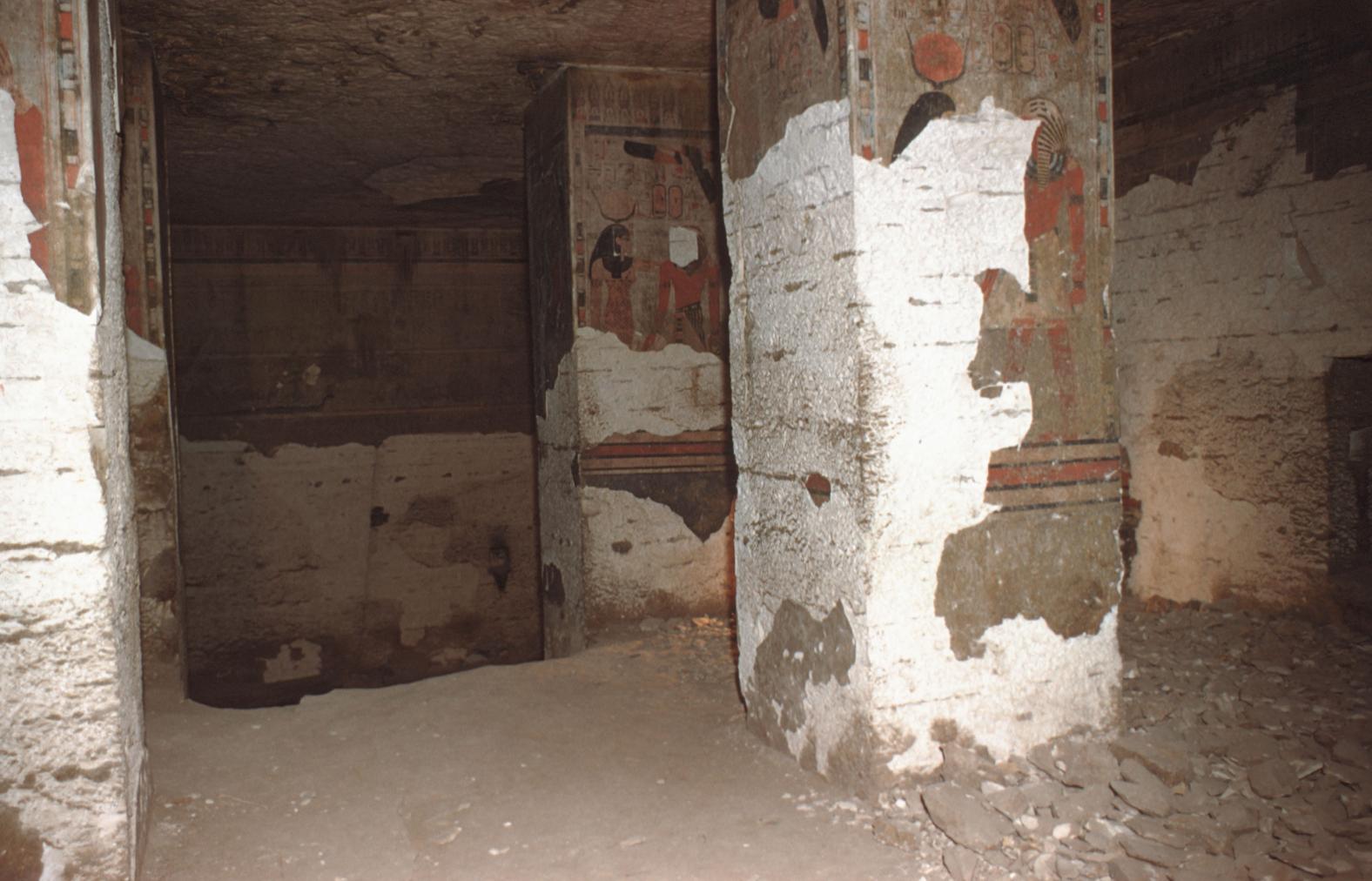
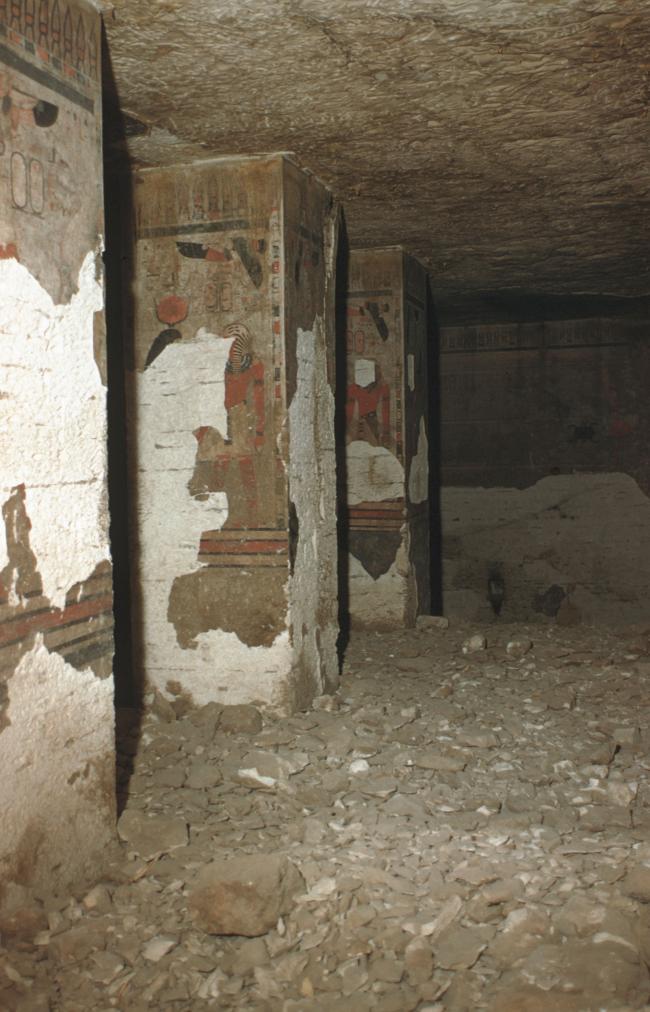
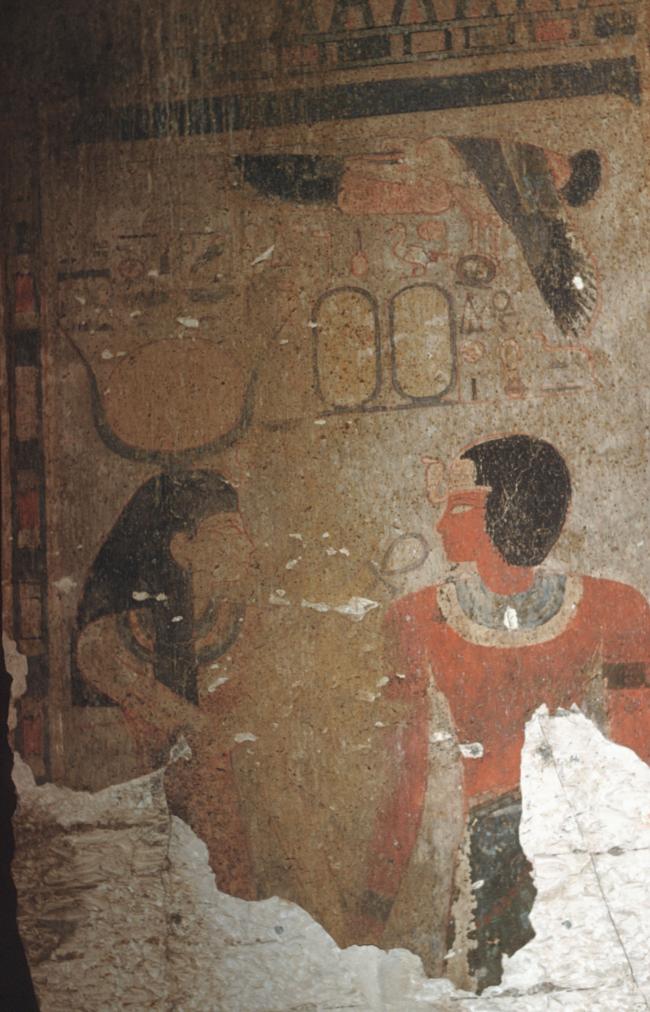
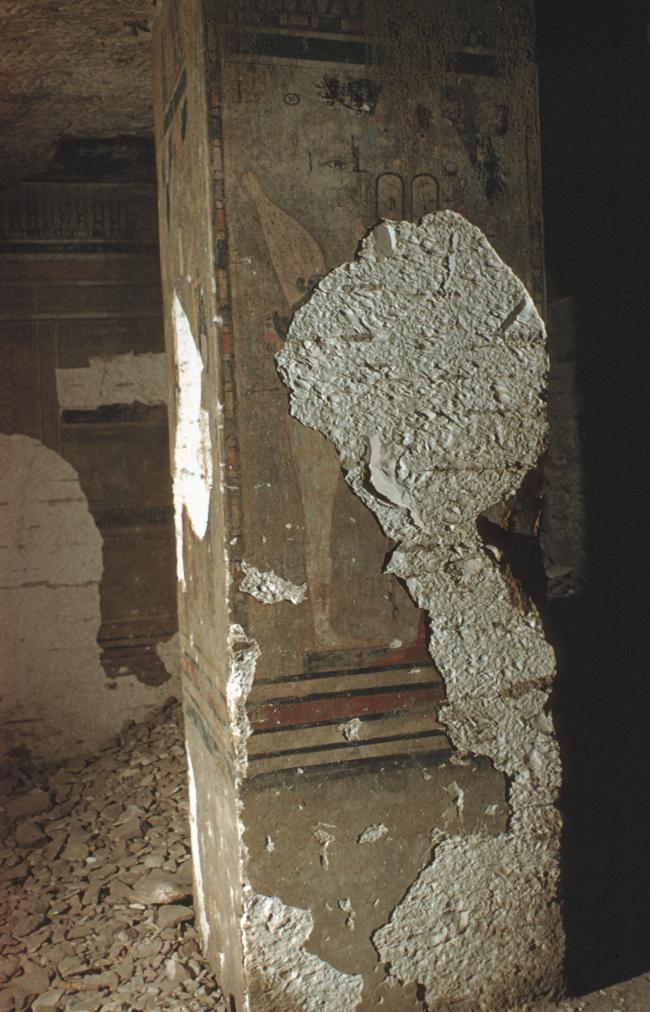
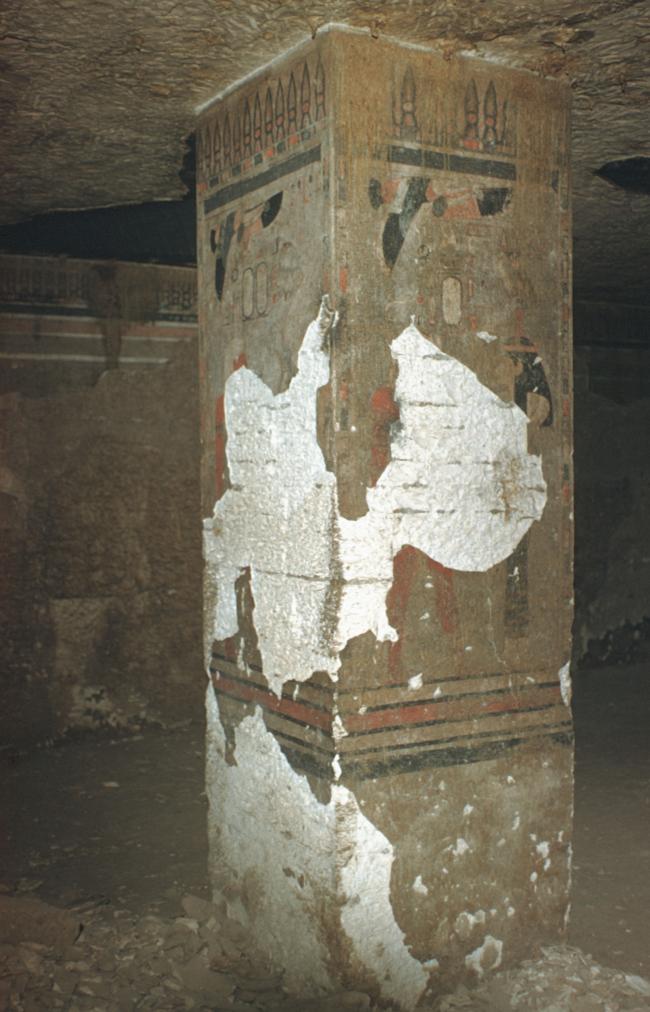
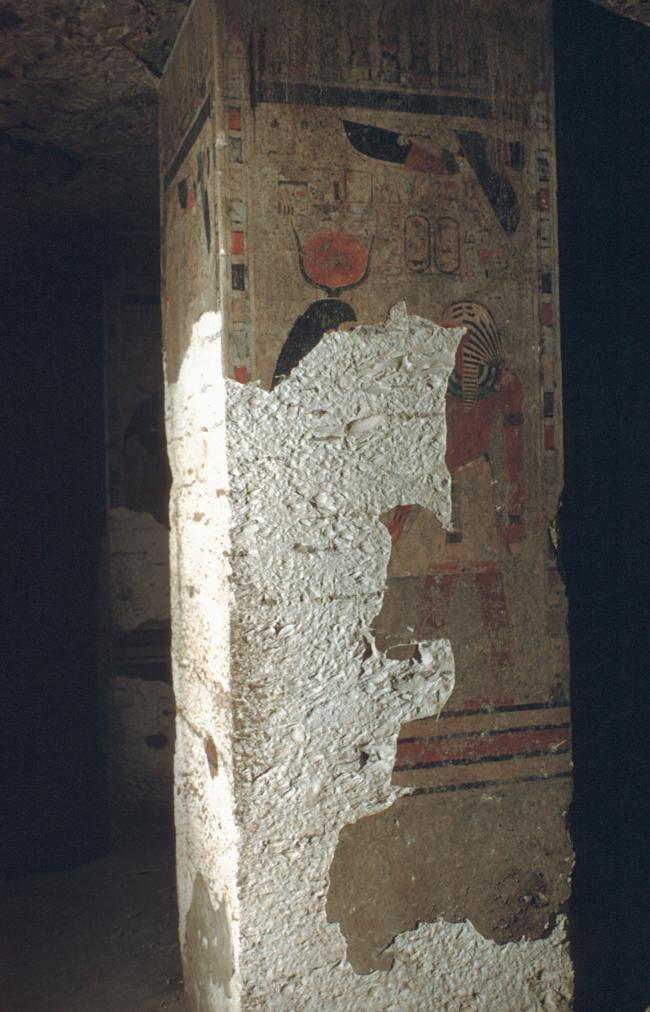
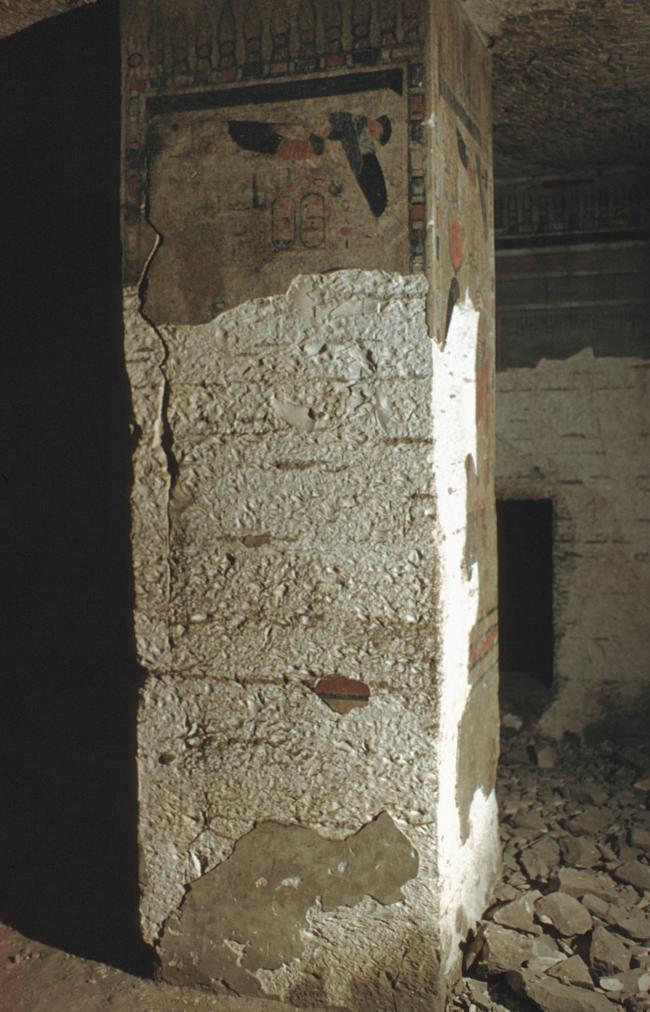
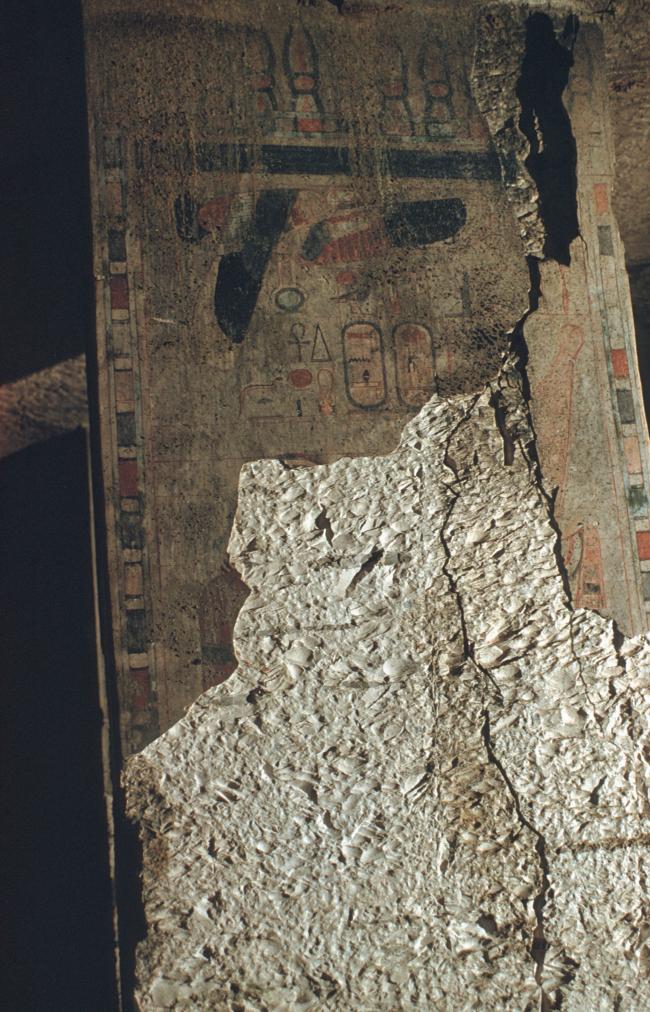
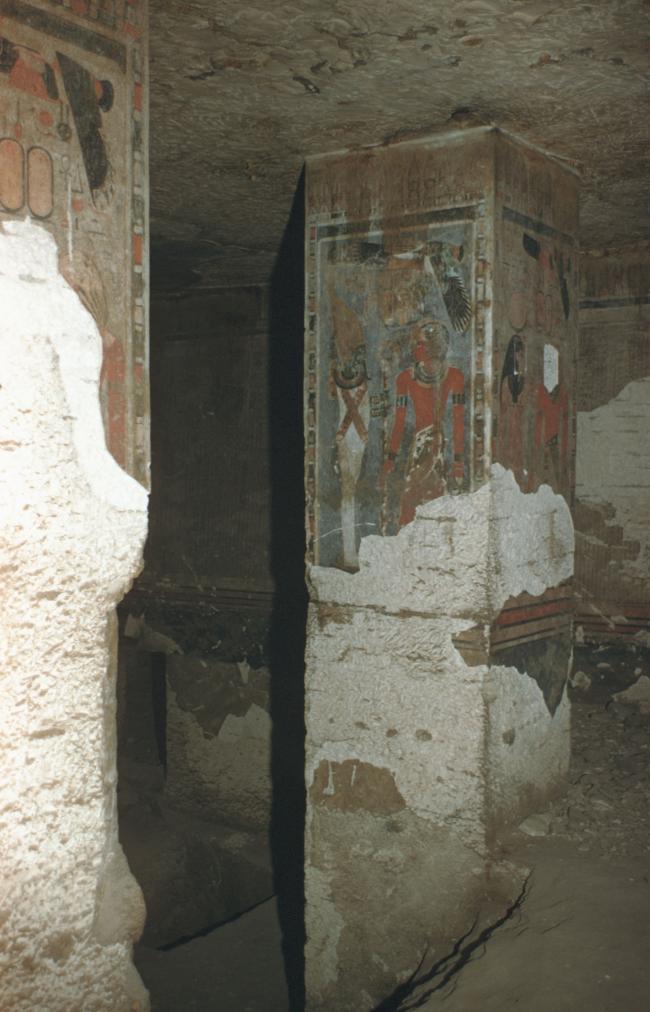
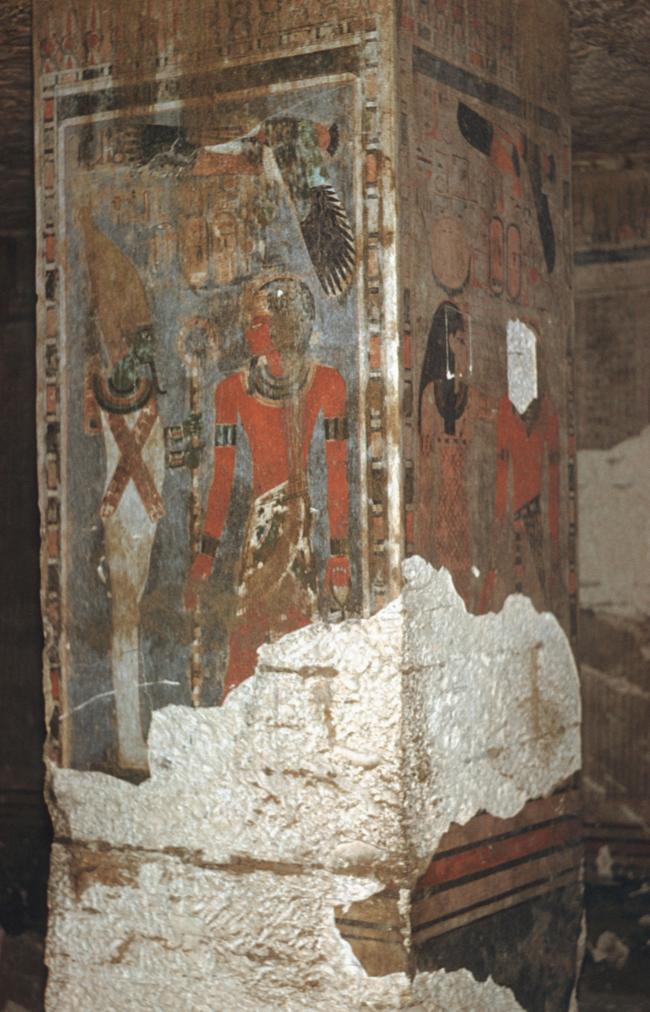
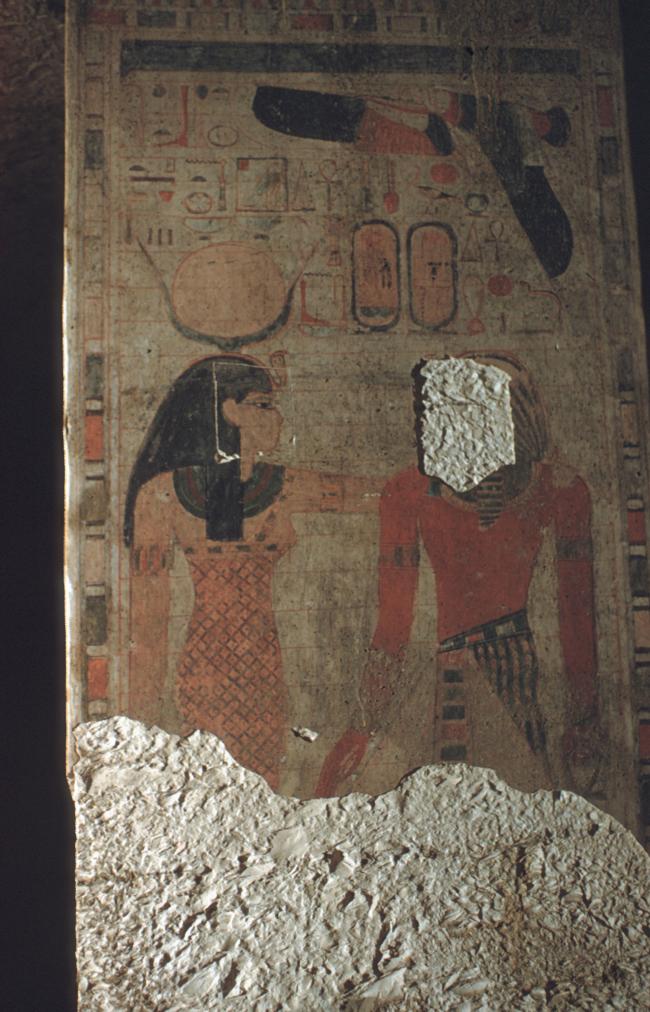
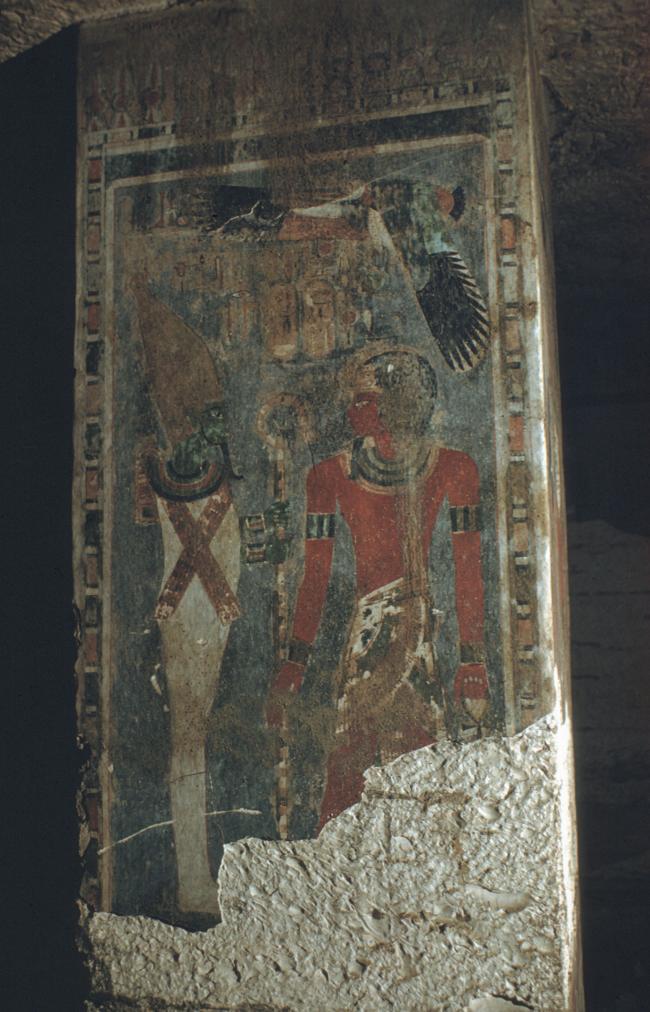
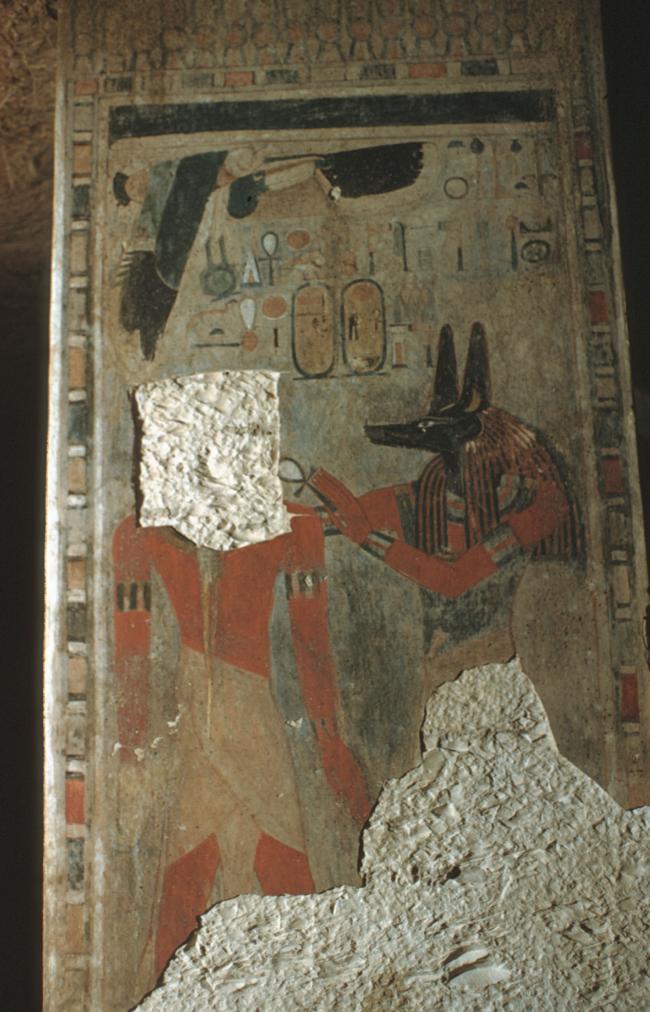
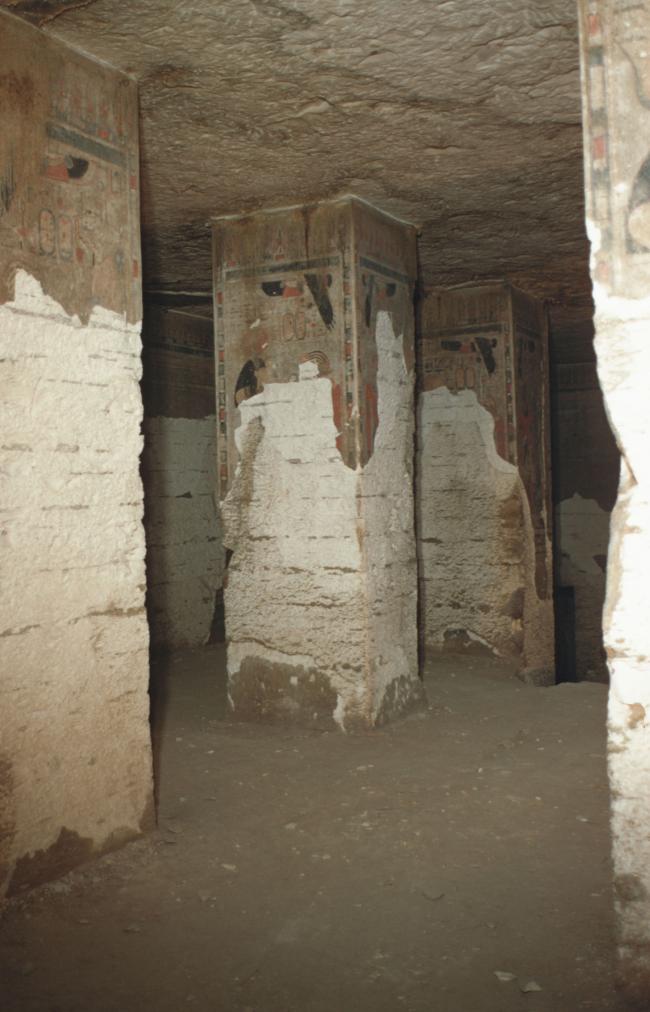
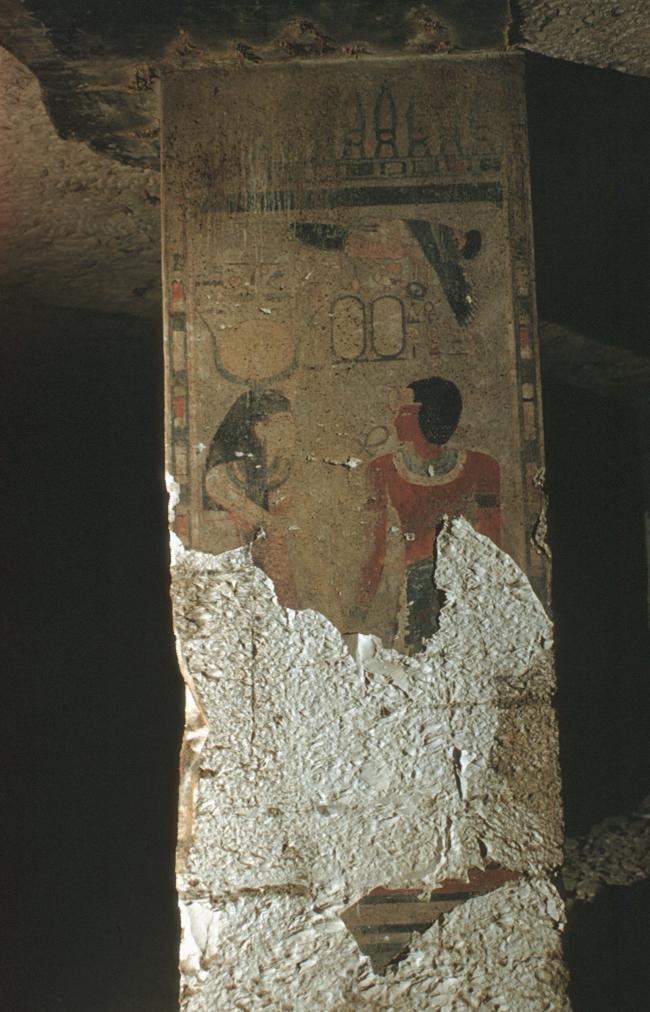
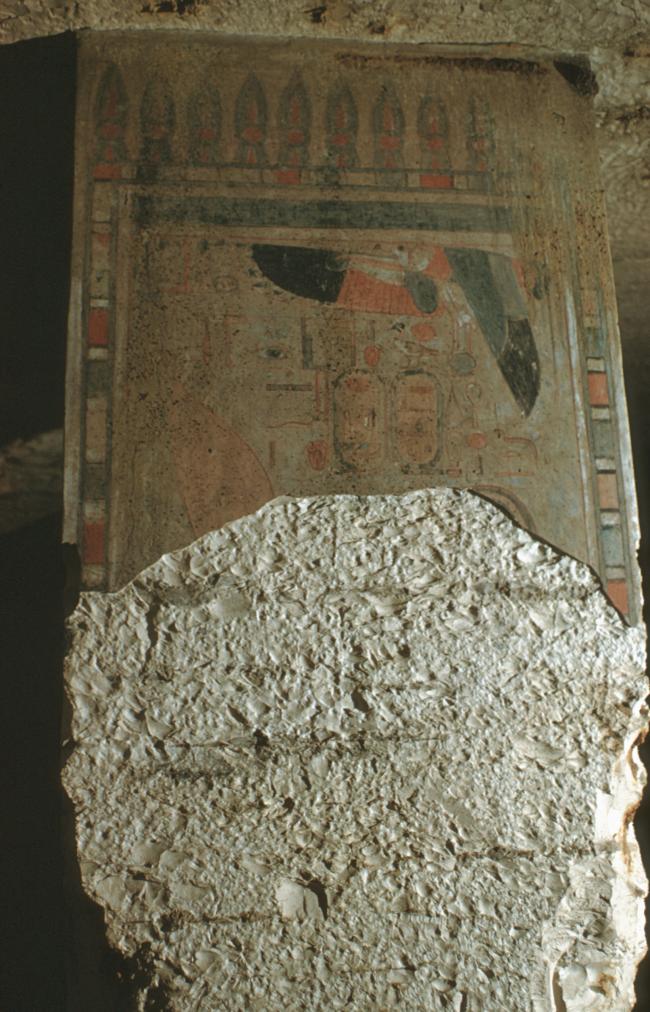
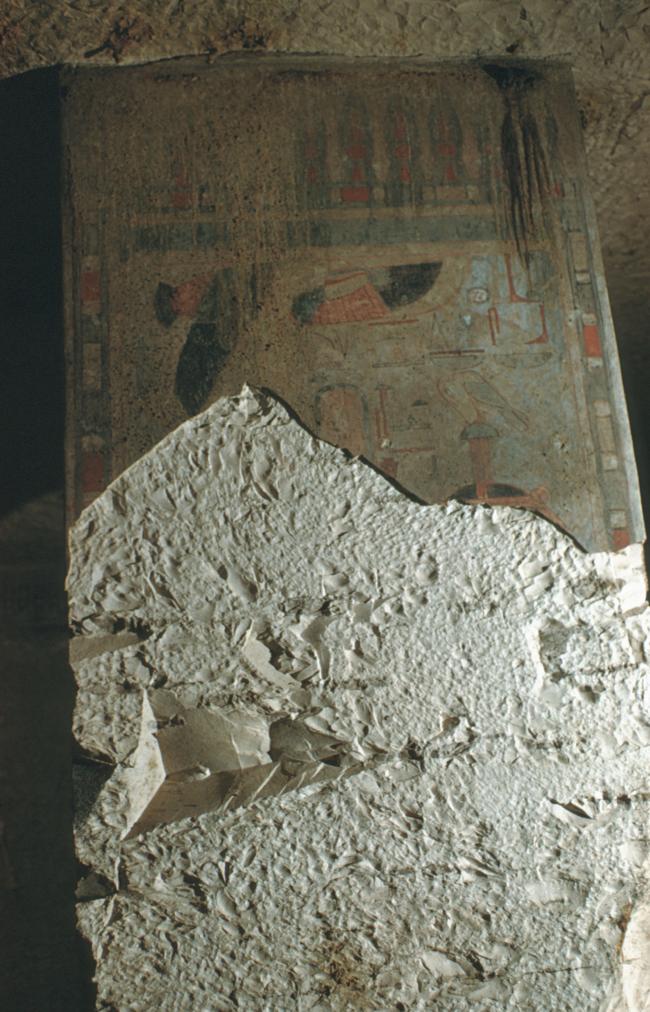
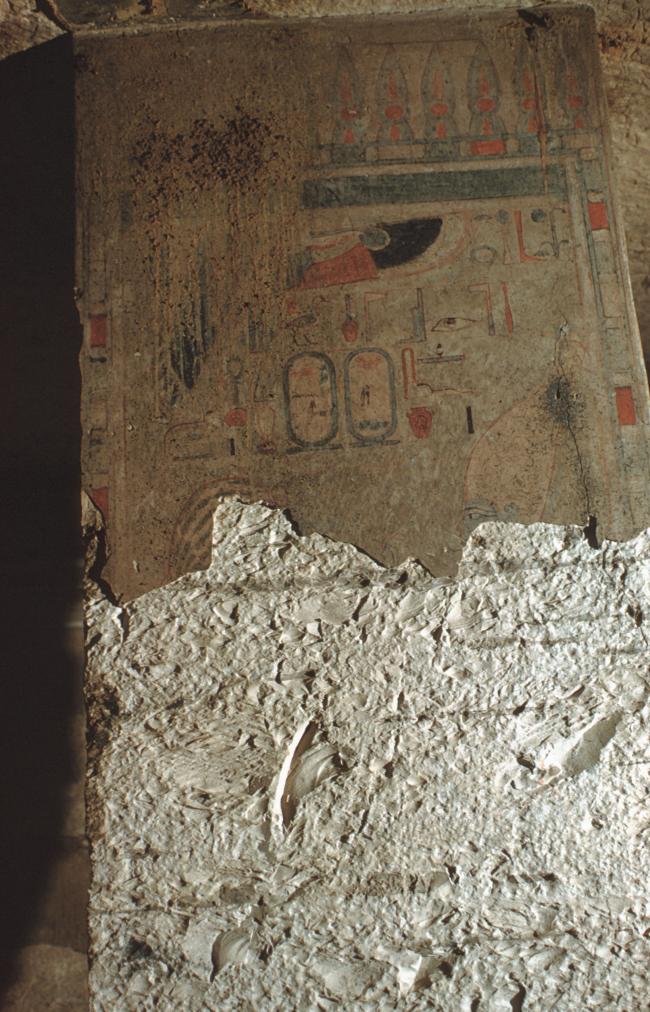
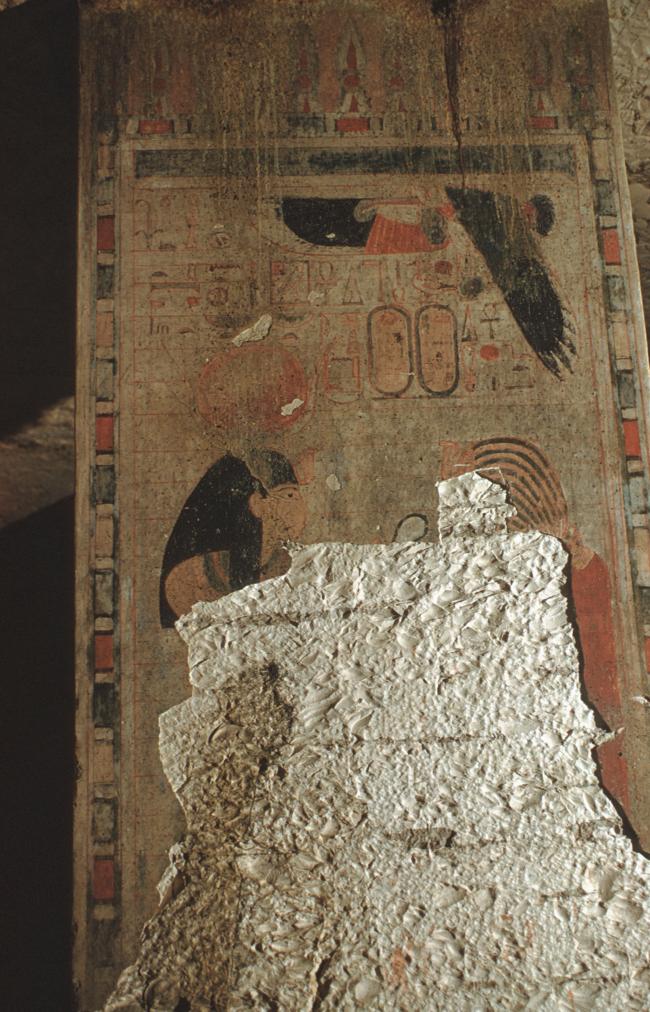
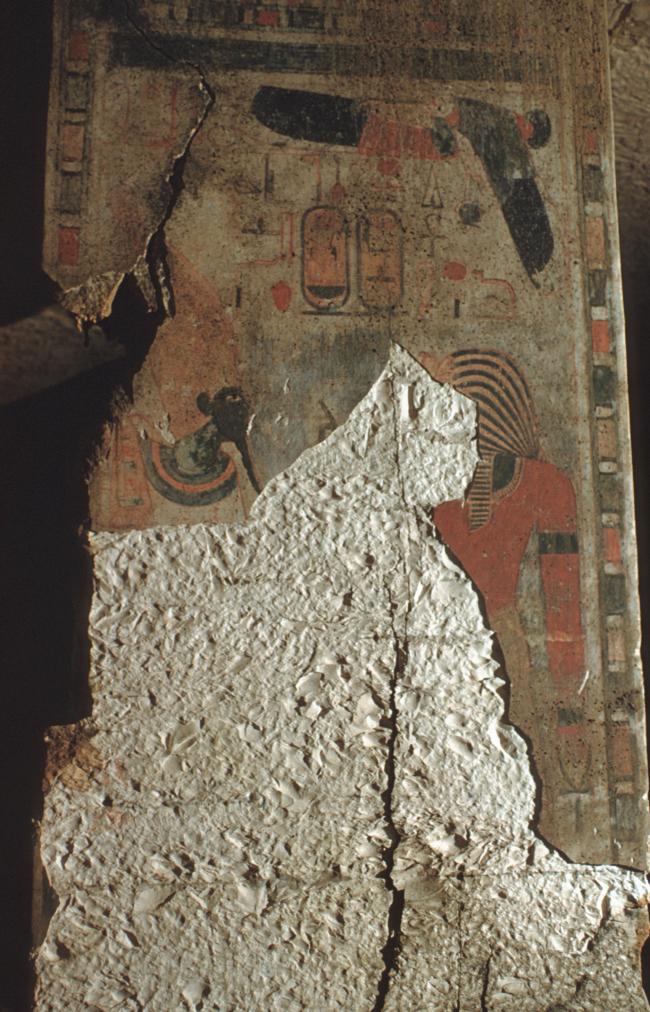
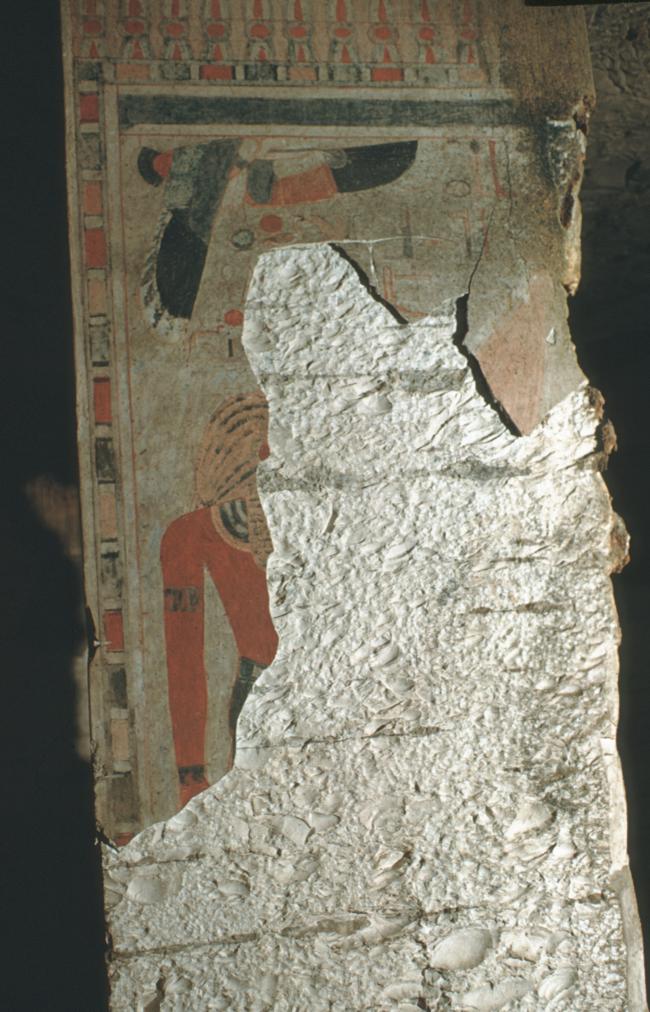
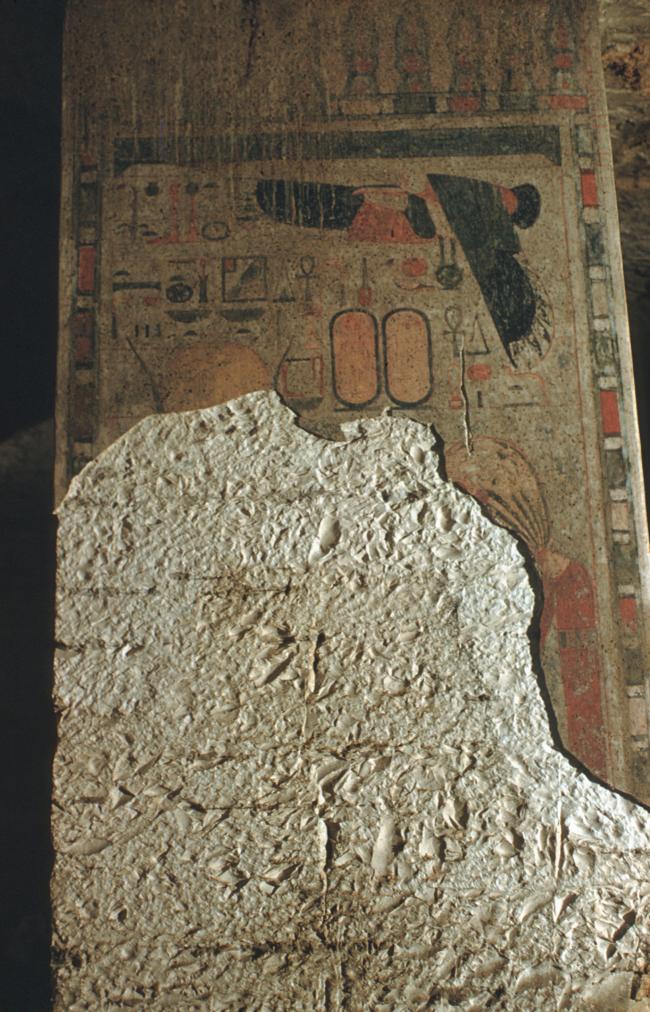
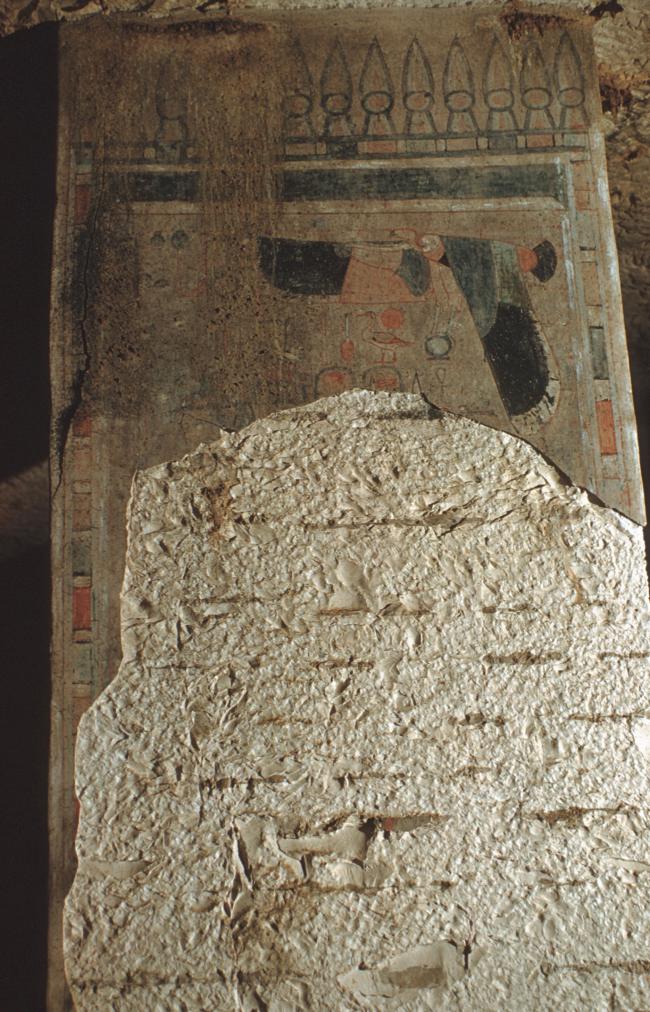
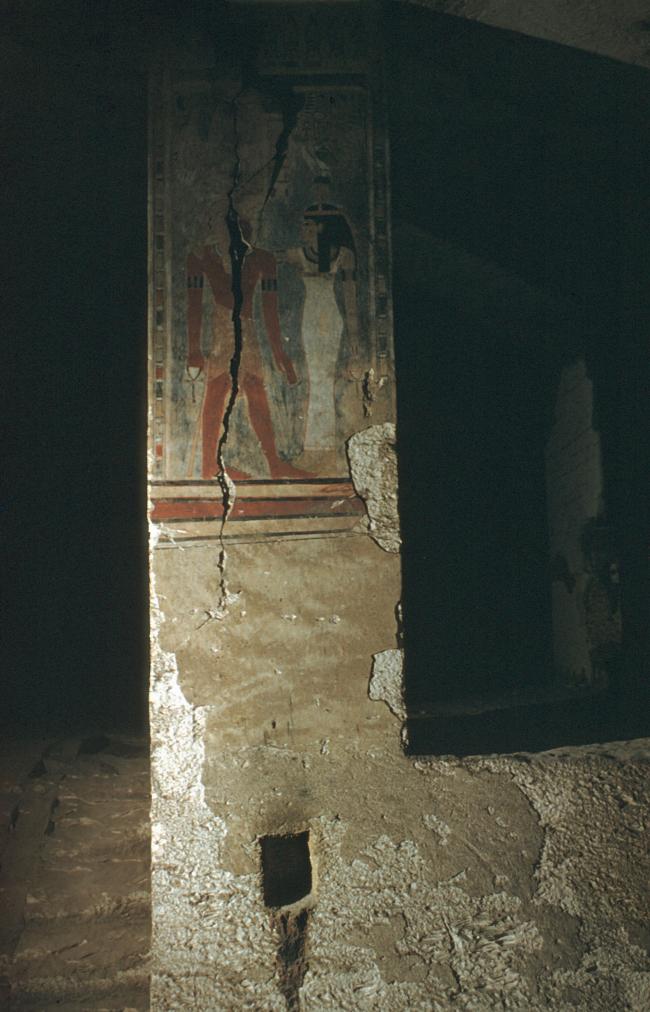
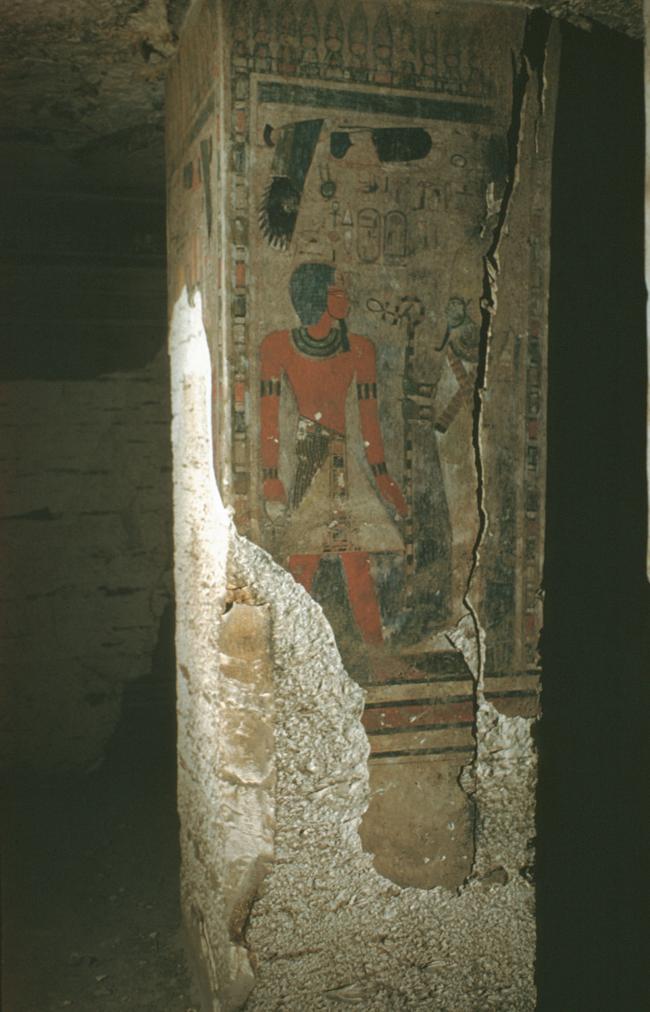
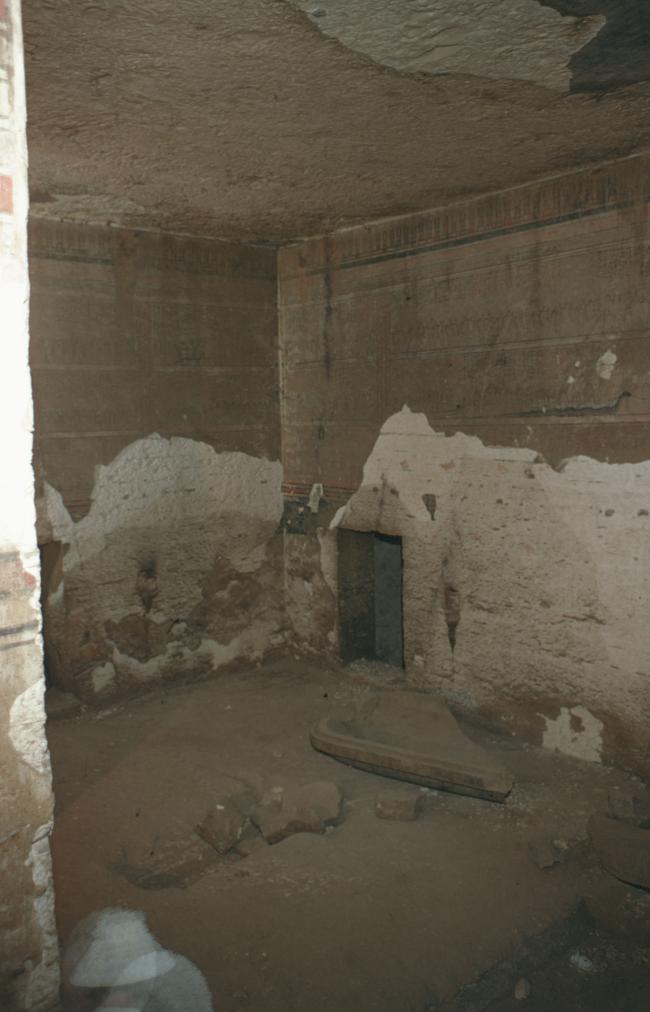
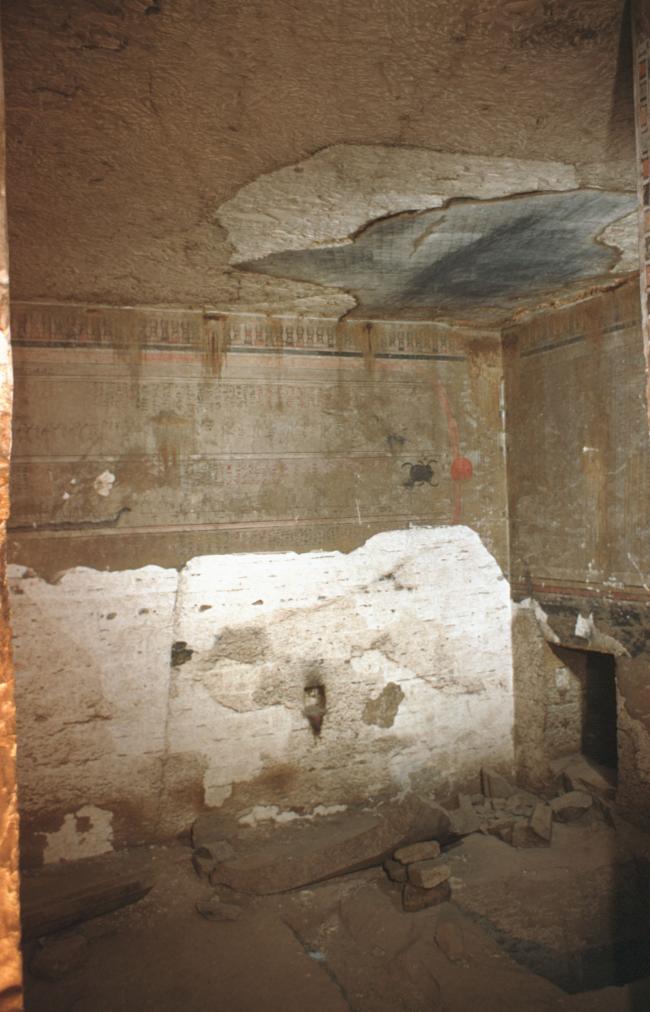
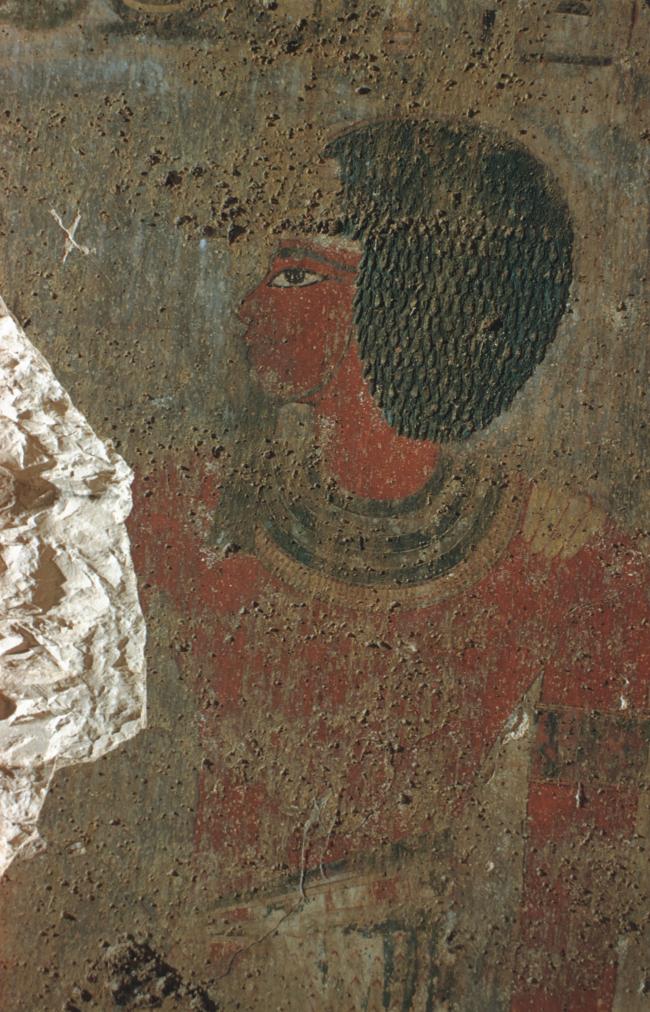
Gate Ja
See entire tombThe gate in the center of the rear (north) wall of the upper level of the burial chamber leads into side chamber Ja. There is a rectangular recess in the left (west) thickness. The threshold is raised above the level of the floor in side chamber Ja and the upper level floor of burial chamber J.
Side chamber Ja
See entire tombThis undecorated rectangular chamber extends north and is reached by a gate through the rear (north) wall of burial chamber J.
Gate Jb
See entire tombGate Jb leads into side chamber Jb. There is a recess in the left (west) thickness. The level of the threshold is raised above the floor levels of the lower level of burial chamber J and of side chamber Jb. A stone block has recently been set inside gate Jb as a step down.
Porter and Moss designation:
Side chamber Jb
See entire tombTraces of cutting marks on the front (south) wall and ceiling show that this chamber was enlarged from a smaller single side chamber. A single pillar stands in the center of the chamber. The gate in the east wall leads to side chamber Jbb.
Porter and Moss designation:
Side chamber Jbb
See entire tombThis rectangular chamber extends east from side chamber Jb. The floor level is below that of side chamber Jb.
Porter and Moss designation:
Gate Jbb
See entire tombThe threshold is raised above the floor level of side chamber Jb.
Porter and Moss designation:
Gate Jc
See entire tombThe gate leads from burial chamber J into side chamber Jc. There is a recess in the right (south) thickness. The level of the threshold is raised above the floor of burial chamber J and the side chamber Jc. A stone block has been placed inside the door as a modern step.
Porter and Moss designation:
Side chamber Jc
See entire tombThis large, rectangular chamber extends east from the burial chamber. The floor of the chamber is 0.65 m lower than that of the burial chamber. A side chamber Jcc is reached through a gate in the southeast corner and a single pillar stands in the middle. The walls and pillar of this chamber were plastered, and a border of kheker friezes was begun over the entrance and north side.
Porter and Moss designation:
Gate Jcc
See entire tombThis side chamber extends east of side chamber Jc.
Porter and Moss designation:
Side chamber Jcc
See entire tombThe level of the floor is lower than that of side chamber Jc.
Porter and Moss designation:
Gate Jd
See entire tombThe gate in the left (east) end of the front (south) wall of the lower level of burial chamber J leads to side chamber Jd. There is a rectangular recess in the left (east) thickness. The threshold is raised above the floor levels of side chamber Jd and burial chamber J.
Porter and Moss designation:
Side chamber Jd
See entire tombThis rectangular chamber extends south and is reached by a gate from the southeast corner of the burial chamber. A horizontal slot cut in the front (north) wall above the gate may be an emplacement for a beam to hold a door pivot.
Porter and Moss designation:
Gate Je
See entire tombThe gate in the front (south) wall of the raised portion of burial chamber J, opposite pillar 3, leads to side chamber Je. There is a rectangular recess in the left (east) thickness. The level of the threshold is raised above the floors of burial chamberJ and side chamber Je.
Porter and Moss designation:
Side chamber Je
See entire tombThis rectangular chamber, extends to the south and is reached by a gate from the center of the front wall of burial chamber J.
Porter and Moss designation:
About
About
KV 22 lies midway into the West Valley on an embayment on the east side. In plan, it is very similar to the tomb of Thutmes IV (KV 43). It consists of two corridors (B, D), separated by a stairwell (C), leading to well chamber E with shaft and side chamber Ea, a pillared chamber (F) with side descent, a corridor (G), a stairwell (H), another chamber (I), and the burial chamber J. The burial chamber has several side chambers leading off it (Ja-Je). Side chambers Jb and Jc each have a side chamber (Jbb and Jcc).
The tomb is decorated with the Imydwat (burial chamber J) and representations of the deceased with deities (well chamber E, chamber I, burial chamber J). KV A, a commencement or pit close to KV 22, may have served as the tomb’s store room.
Noteworthy features:
This tomb is the largest in the West Valley of the Kings. Two subsidiary burial suites, with pillar and side chamber, are located off burial chamber J. There is a pit for canopic equipment. The king represented with the royal Ka is rather unique.
Site History
The tomb was apparently initiated by Thutmes IV, as his name appears on material in the foundation deposits. It was completed and decorated by Amenhetep III. It is possible that Tiyi and Sitamen were also to be buried here. The Sarcophagus box was removed at some unknown time in antiquity, perhaps for reuse, although no trace of it has been found. The mummy of the king was moved to the cache in KV 35 during the reign of Smendes. There is evidence of intrusive burials, probably of the Third Intermediate Period, including fragments of a wooden Coffin in the well.
Dating
This site was used during the following period(s):
Exploration
Conservation
Conservation History
The tomb was superficially cleared by Theodore Davis in 1905-1914. Howard Carter excavated more thoroughly in 1915. Over three seasons in 1989 and 1990, the tomb was re-cleared by Sakuji Yoshimura and Jiro Kondo of Japan's Waseda University. Now, they are focussing on conserving and cleaning paintings on the walls and ceiling of the tomb.
Site Condition
During the nineteenth century, unknown visitors to the site removed several paintings of faces from the walls and pillars, some of which are now in the Louvre. The paintings have been damaged by salt efflorescence. Cracks in the pillars have expanded.
Hieroglyphs
Amenhetep III
 King of Upper and Lower Egypt, Lord of Justice is Ra, Son of Ra, Amen is Satisfied, Ruler of Thebes
niswt-bity nb-mAat-Raw sA-Raw Imn-Htp HqA-WAst
King of Upper and Lower Egypt, Lord of Justice is Ra, Son of Ra, Amen is Satisfied, Ruler of Thebes
niswt-bity nb-mAat-Raw sA-Raw Imn-Htp HqA-WAst


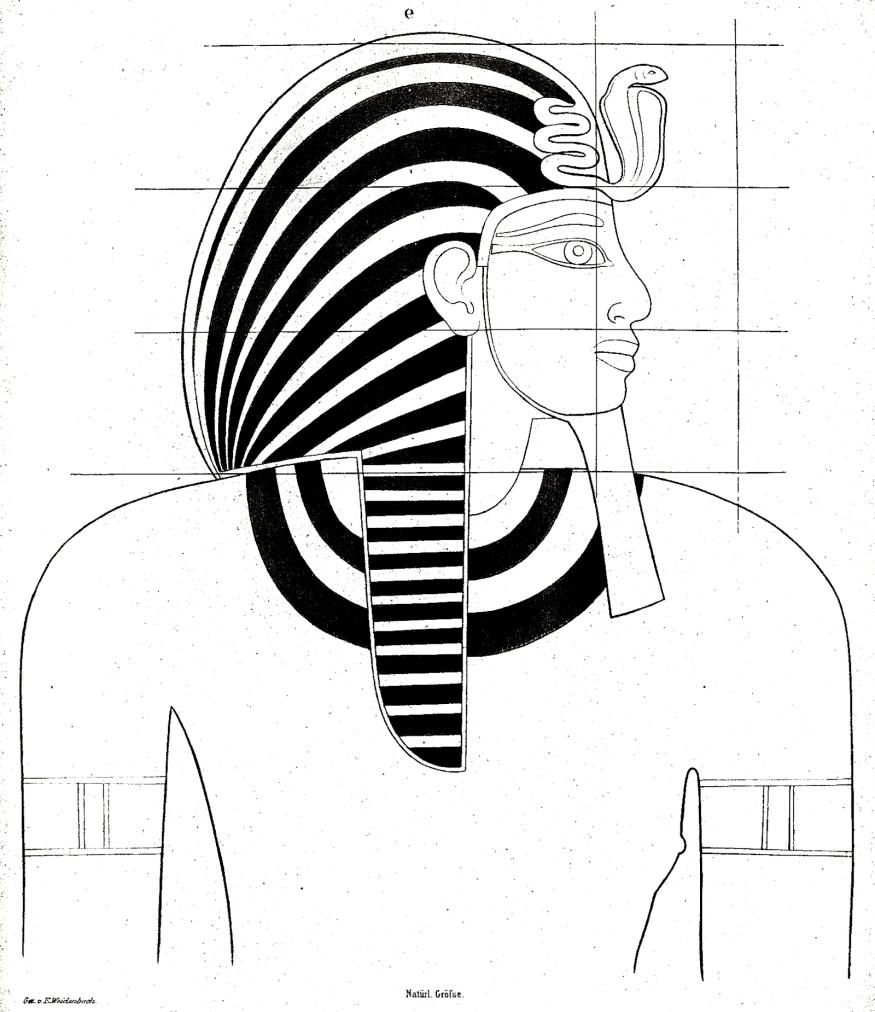



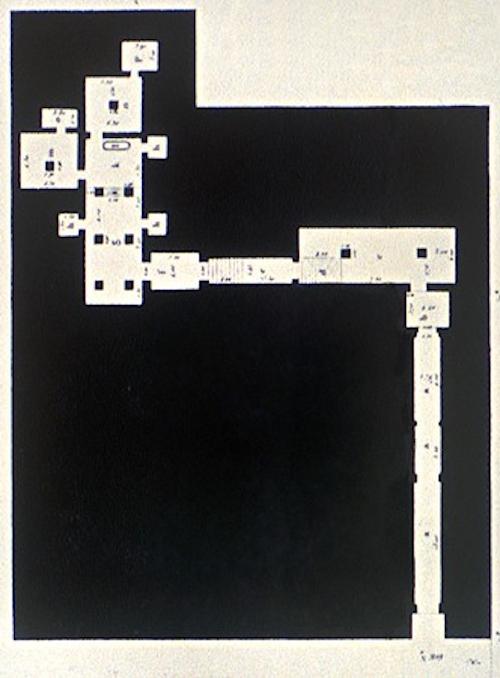
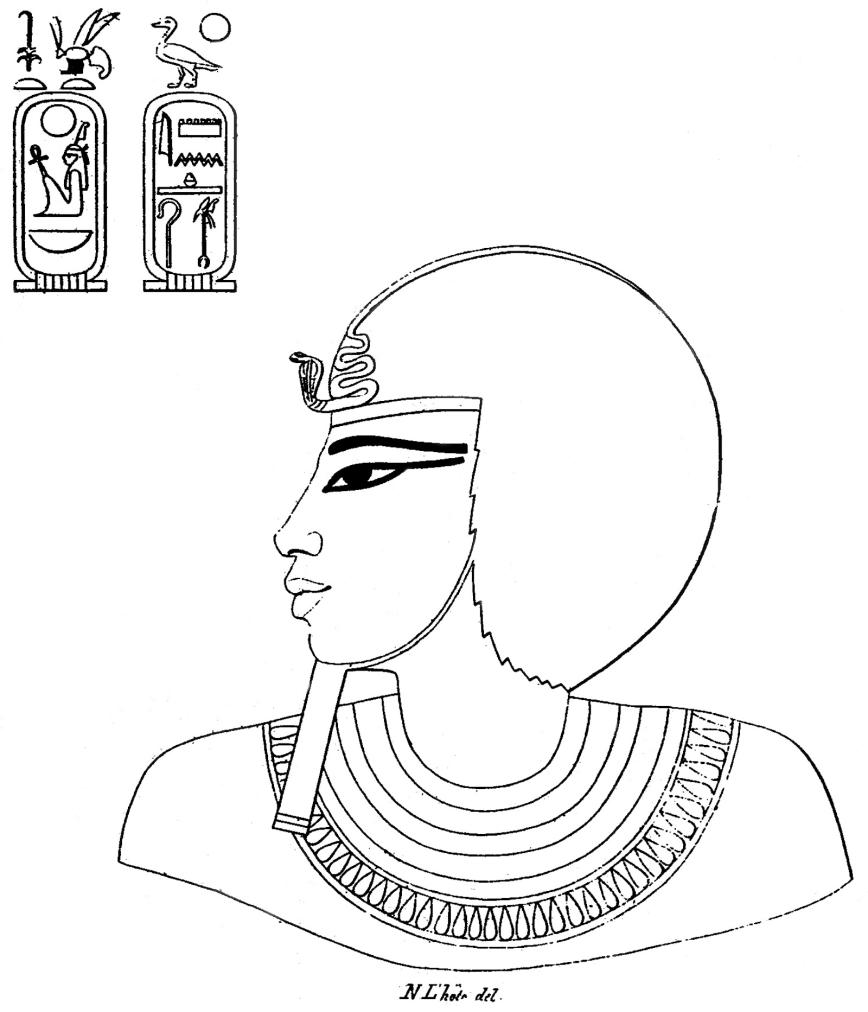


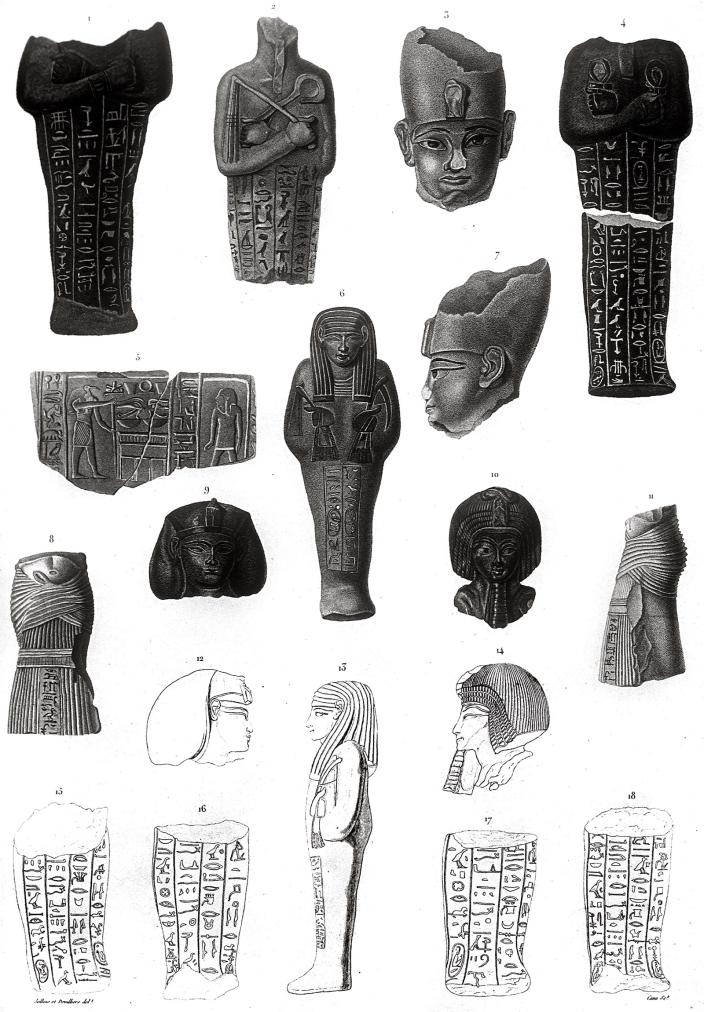
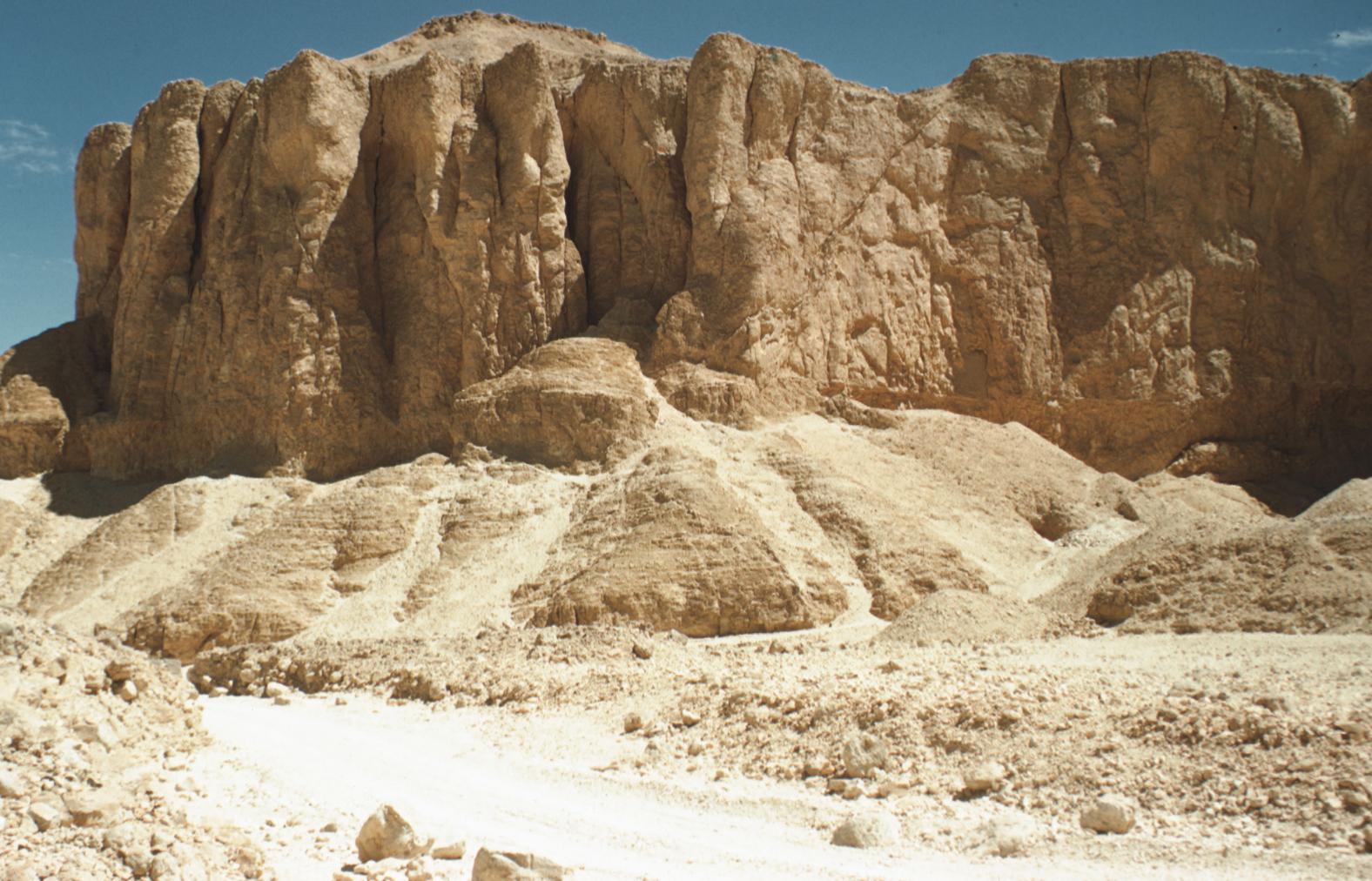
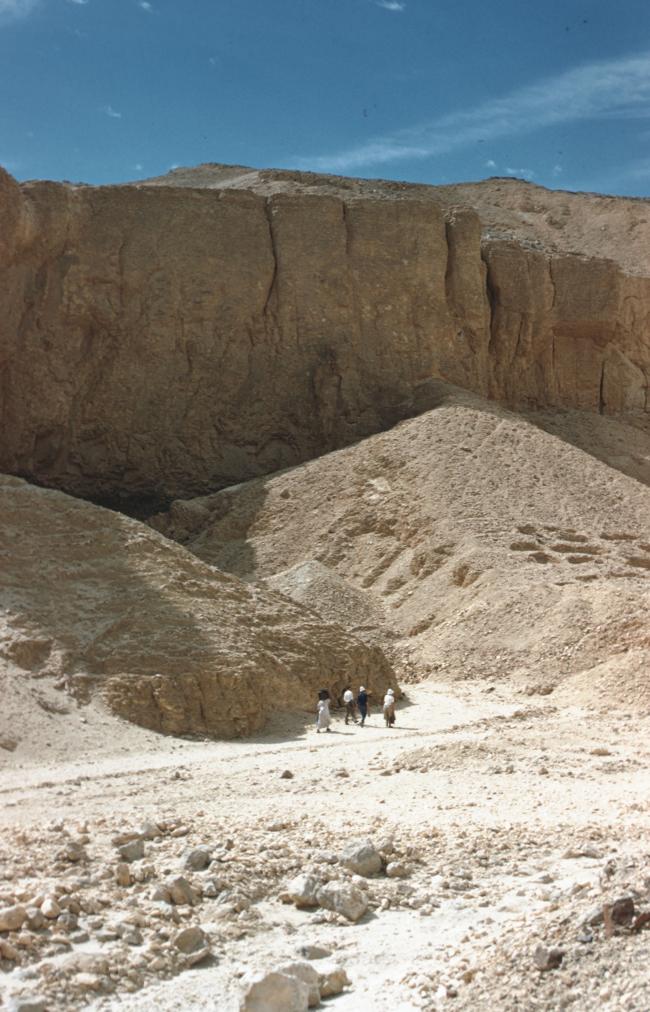














































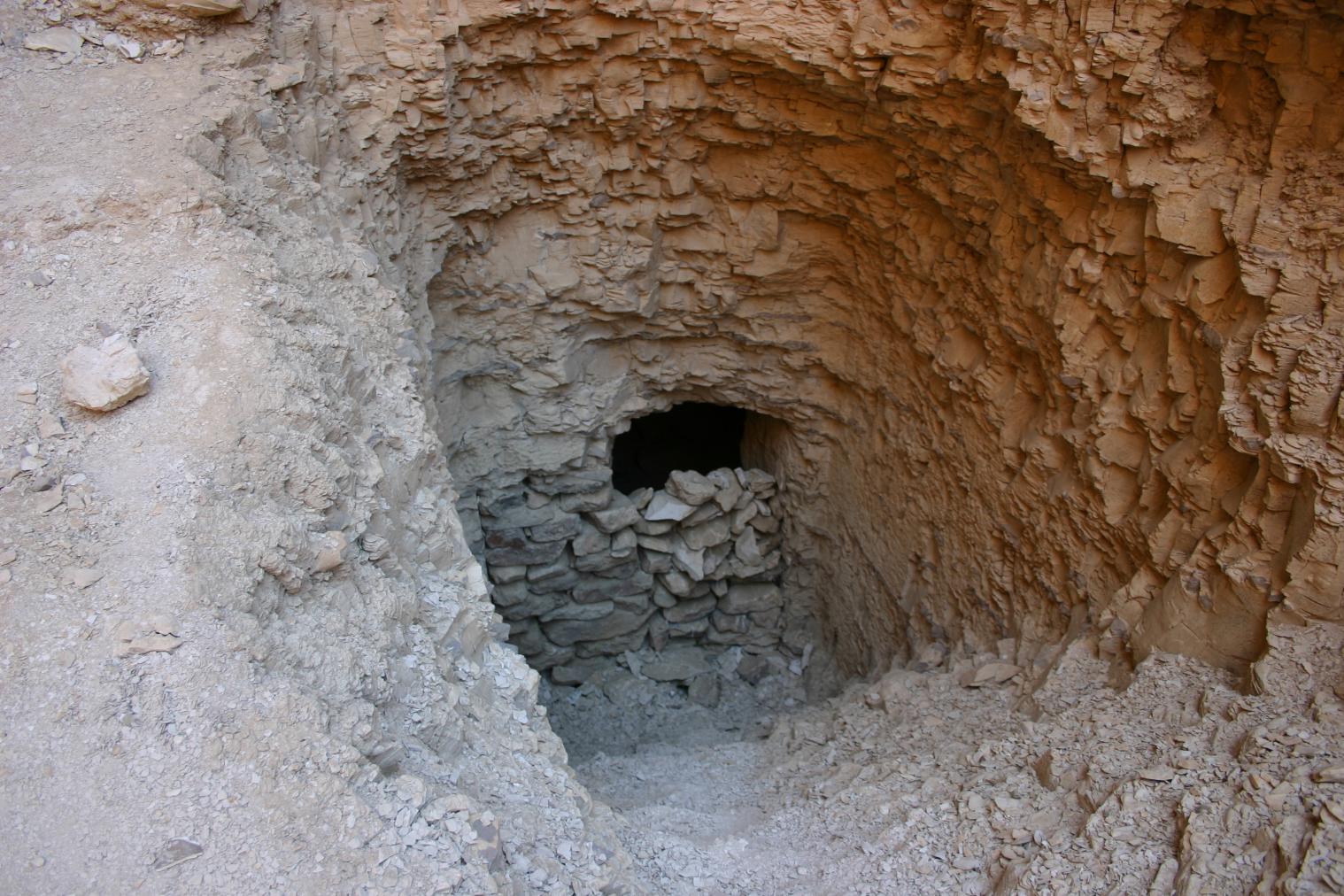
Articles
Historical Development of the Valley of the Kings
History of the Valley of the Kings: Third Intermediate Period to the Byzantine Period
Anatomy of a Tomb: Ancient and Modern Designations for Chambers and Features
Bibliography
Brock, Lyla P. A Walk-through Tour of WV22: The West Valley Tomb of Amenhotep III. Amarna Letters 2 (San Francisco, 1992): 18-27.
Hayes, William C. Royal Sarcophagi of the XVIIIth Dynasty (= Princeton Monographs in Art and Archaeology, Quarto Series, 19). Princeton, 1935. Pp. 28-32, 57-60, 123-131, 170-171, 183-204.
Helck, Wolfgang. Königsgräbertal. Wolfgang Helck, Eberhart Otto and Wolfhart Westendorf (eds.). Lexikon der Ägyptologie. 7 vols. Wiesbaden, 1972-1992. 3: 519.
Kikuchi, T. Graffiti Nr 3974-3982 aus dem Gebiuet des Grabes Amenophis’ III im Westtal der Könige. Memnonia 7 (1996): 163-184.
Kondo, Jiro. A Preliminary Report on the Re-clearance of the Tomb of Amenophis III (WV 22). In: Carl Nicholas Reeves (ed.), After Tutankhamun: Research and Excavation in the Royal Necropolis at Thebes (= Studies in Egyptology). London: KPI, 1992. Pp. 41-54.
Kondo, Jiro. Hieratic Inscriptions From the Tomb of Amenophis III. Orient 26 (1990): 94-104.
Kondo, Jiro. The Re-clearance of Tombs WV 22 and WV A in the Western Valley of the Kings. In: Richard H. Wilkinson (ed.), Valley of the Sun Kings: New Expeditions in the Tombs of the Pharaohs. Tucson: University of Arizona Egyptian Expedition, 1995. Pp. 25-33.
Lefebure, Eugène. Les hypogées royaux de Thèbes, seconde division: Notices des hypogées (=Mémoires publiés par les members de la mission archéologie française au Caire 3, 1). Paris, 1889. P. 172-174.
Marqués Lopez, José. El final del periodo de Amarna y el Valle de los Reyes. Boletin de la Asociación Española de Egiptologia 4-5 (1992-1994): 57-80.
